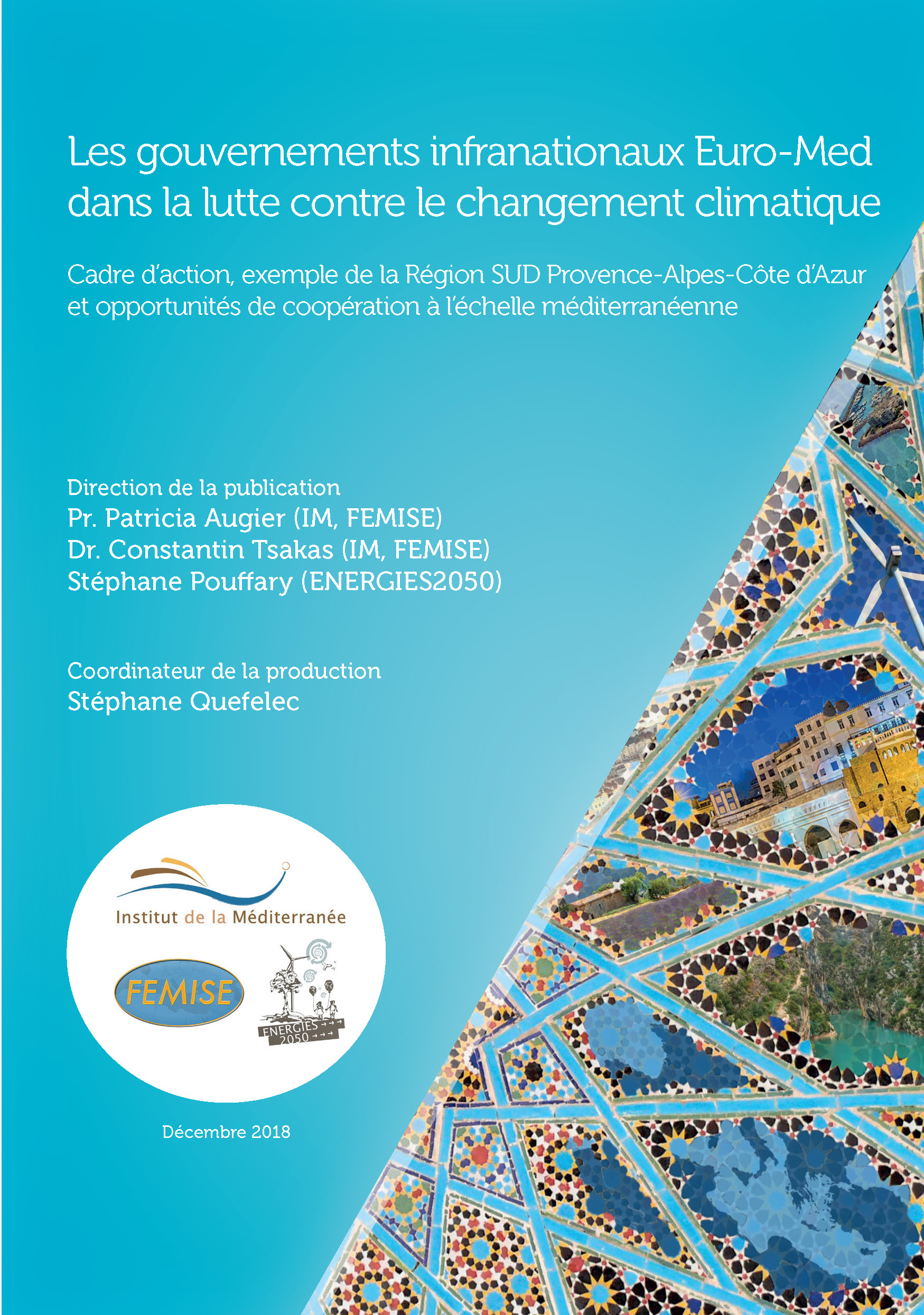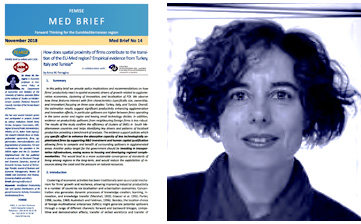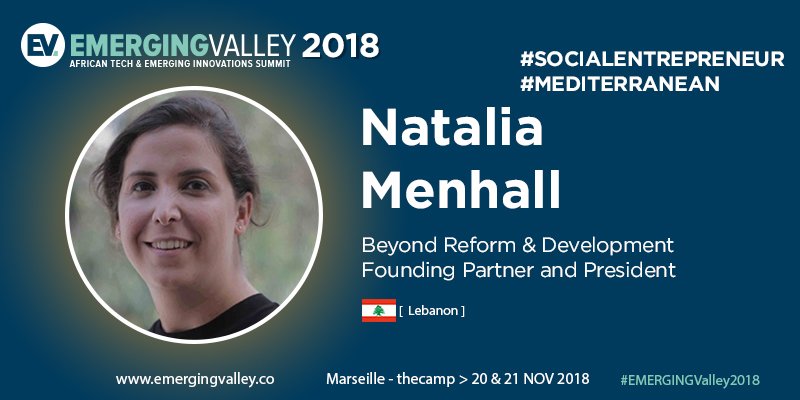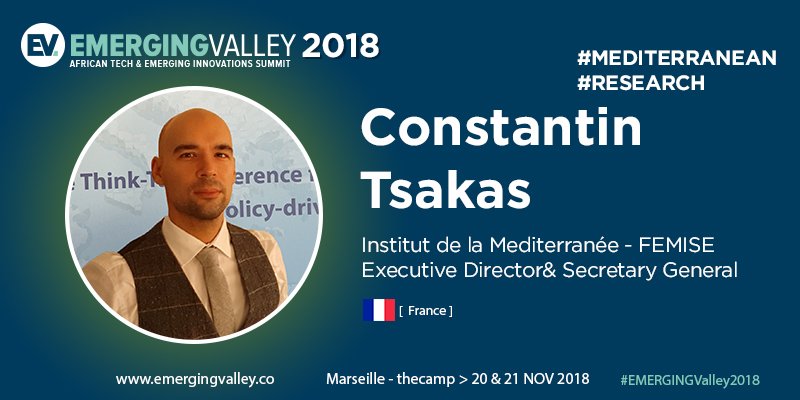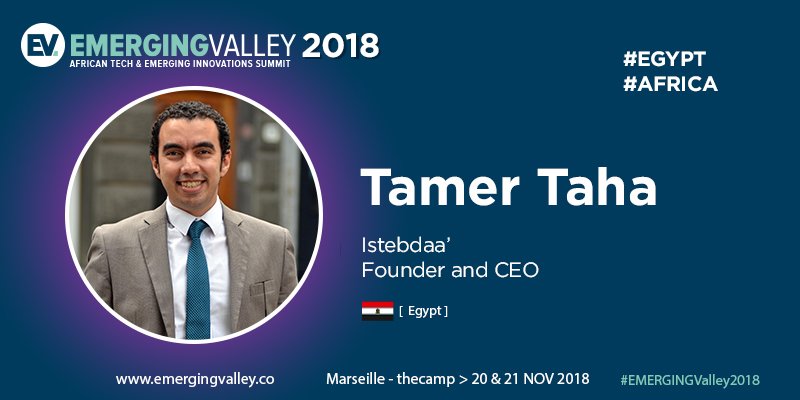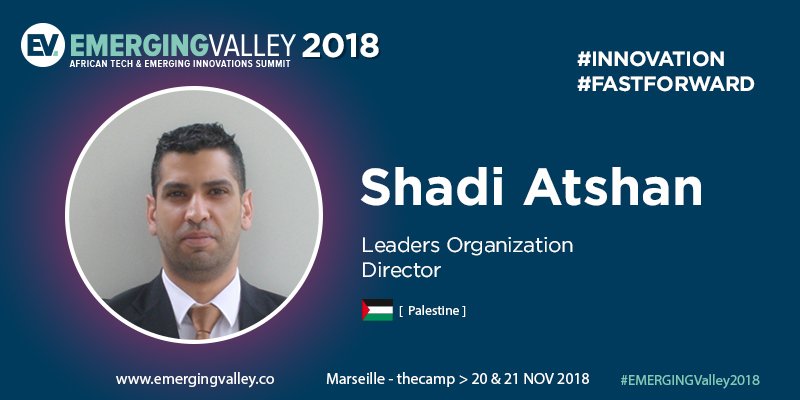 Early childhood is the most important time for human development. However, countries tend to under-invest in this stage of development, particularly in the Middle East and North Africa (MENA). Children are facing unequal opportunities to develop because of the circumstances of their birth. This project analyzes inequality of opportunity in early childhood development in three Southern and Eastern Mediterranean countries (Algeria, Morocco and Tunisia) and three countries from non-EU Eastern Europe (Bosnia, Serbia and Ukraine). The findings demonstrate that there is substantial inequality of opportunity starting early in life. A variety of circumstances impact early inequality, with wealth, mother’s education, and geographic differences all contributing substantially.
Early childhood is the most important time for human development. However, countries tend to under-invest in this stage of development, particularly in the Middle East and North Africa (MENA). Children are facing unequal opportunities to develop because of the circumstances of their birth. This project analyzes inequality of opportunity in early childhood development in three Southern and Eastern Mediterranean countries (Algeria, Morocco and Tunisia) and three countries from non-EU Eastern Europe (Bosnia, Serbia and Ukraine). The findings demonstrate that there is substantial inequality of opportunity starting early in life. A variety of circumstances impact early inequality, with wealth, mother’s education, and geographic differences all contributing substantially.
Tag Archives: femise
FEMISE and Institut de la Méditerranée at COP24 (Katowice, Poland) !
12/12/2018
Socio-Economic intricacies related to Climate Change Towards an EU-Med research agenda and actions (Proceedings of COP24 Workshop)
On the 12th of December 2018, the second side-event co-organized by Union for the Mediterranean, FEMISE, Institut de la Méditerranée, and Energies2050 took place during Cop24 at Katowice, Poland. Entitled “Socio-Economic intricacies related to Climate Change towards an EU-Med research agenda and actions“, this round table was particularly rich in discussions around the role of research in Climate Action in general and on the role of collaboration between stakeholders in order to instigate social change.
Indeed, Jorge Borrego, UfM Senior Deputy Secretary General, Energy Climate Action, Higher Education and Research stated that “a continuous and coordinated action between stakeholders and experts is the key to optimize the fight against climate change”. In order to ask all the relevant questions and provide innovative and forward thinking solutions to local and regional structural obstacles, the Deputy Secretary General highlighted the need to bring together the different approaches to the issues of sustainable development, in general and climate change initiatives, in particular. Jorge Borrego added that the UfM’s approach to climate action is to work with the 5 key actors of climate change negotiations in the South Med, namely the people, the governments and subnational authorities, the private sector actors, the research institutes and experts, and the local, regional and Euro-Med NGOs. As Jorge Borrego said: “It is essential to talk with people and not only about them”.
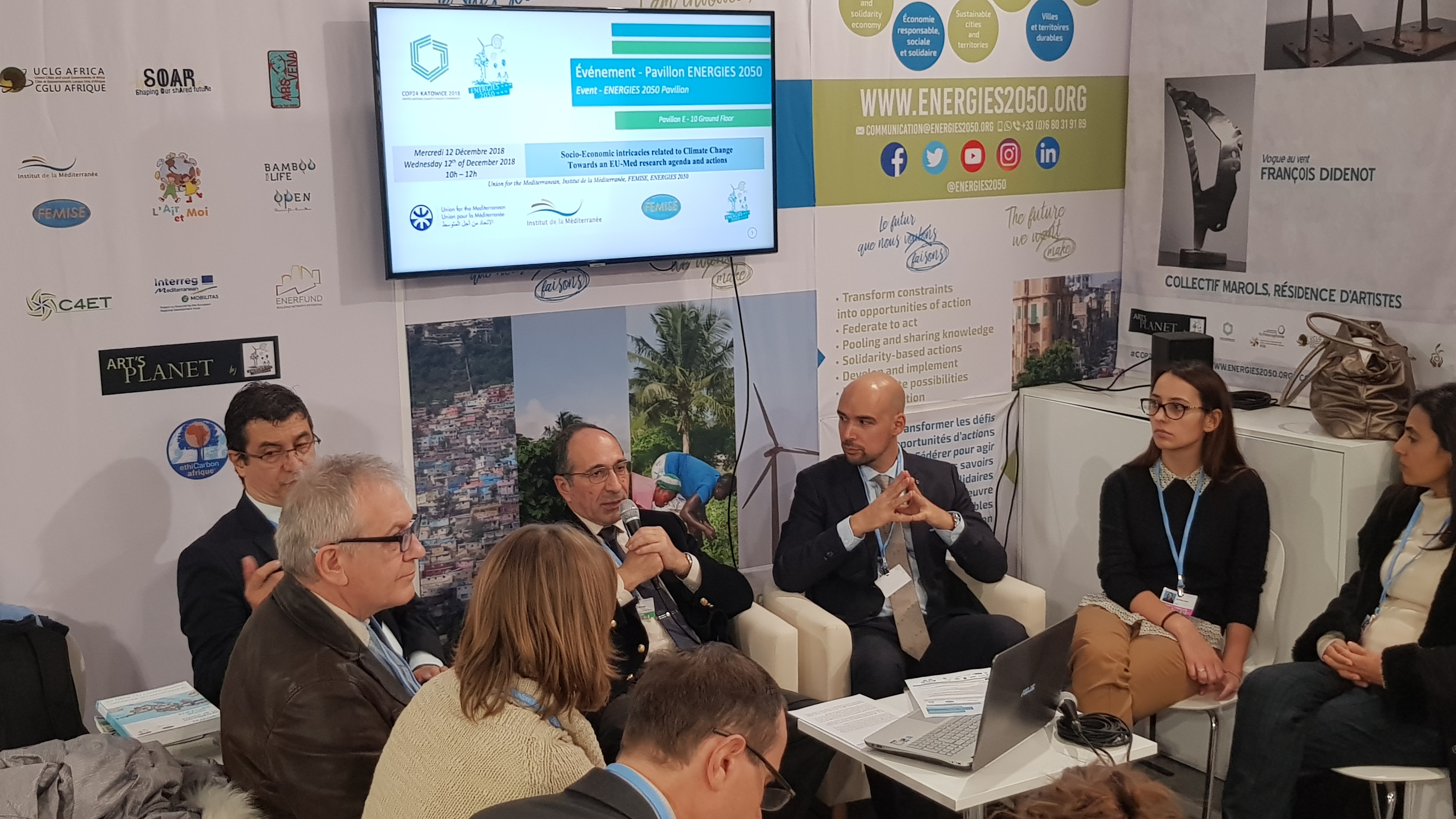
COP24, Katowice, Pologne, pavillon ENERGIES2050
One of the latest collaborations of UfM is with MEDECC, a Marseille-based network of experts to support decision-making. Joël Guiot, MEDECC expert, participated to the workshop where he presented the role of MEDECC as an essential scientific platform for informing all relevant stakeholders of the newest updates concerning climate change. In order to prepare for improved assessments and a comprehensive synthesis of global change knowledge in the Mediterranean region, he stressed the need to have networks of scientists working towards a regional science-policy interface for climatic and other environmental changes across the Mediterranean. Joël Guiot also announced the latest UfM-funded report that MEDECC is preparing which aims both at identifying gaps in the current research on climate change and its impacts in the Mediterranean and to provide concrete solutions to locals and decision makers in the Southern and Eastern Mediterranean Countries.
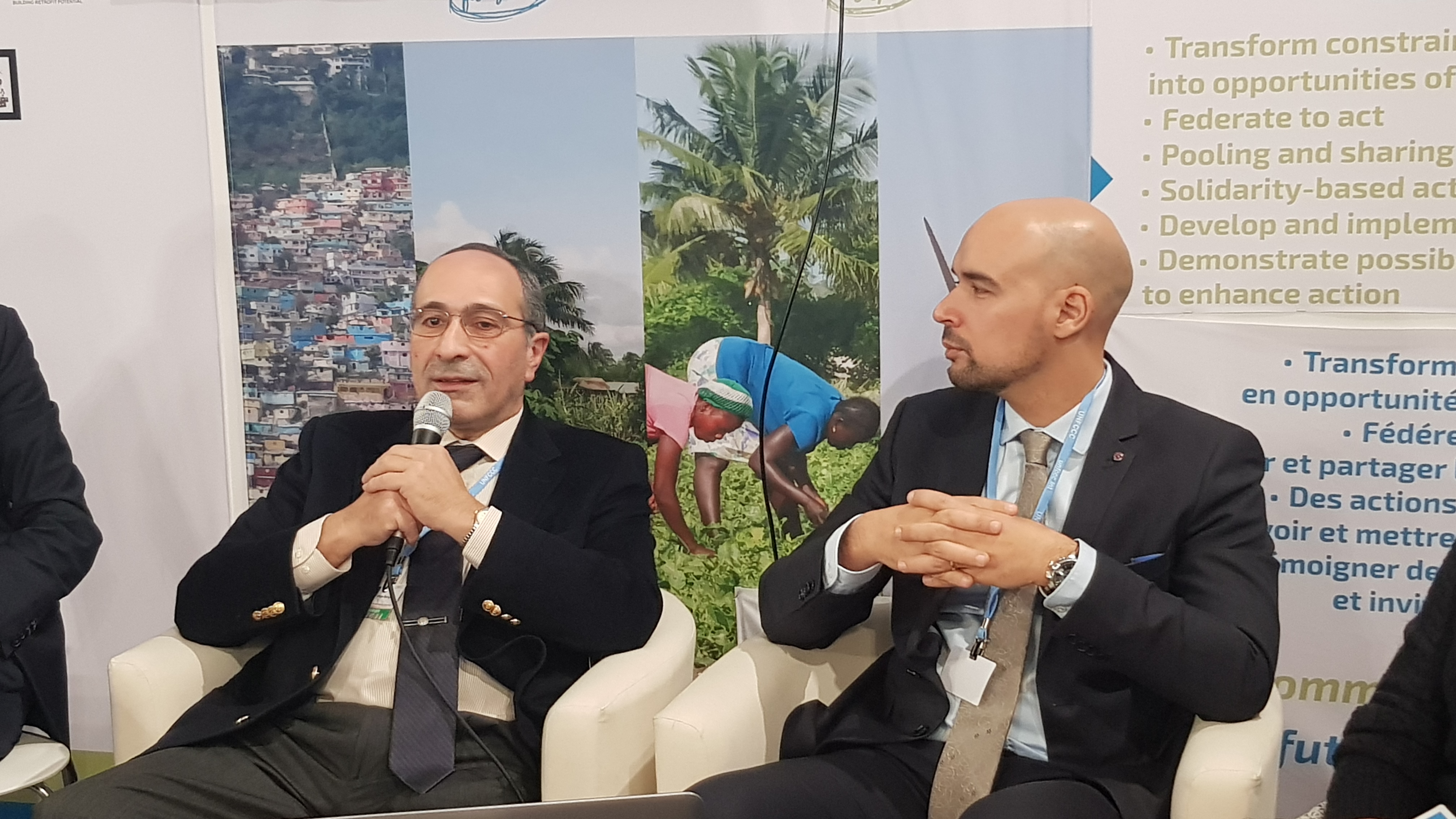
Jorge Borrego (UfM), Constantin Tsakas (IM, FEMISE)
On the other hand, all panelists stressed on the importance of establishing reliable monitoring and reporting mechanisms. The South Med region lacks data on environmental issues making this a priority in the region. Constantin Tsakas, General Manager of Institut de la Méditerranée and General Secretary of FEMISE, highlighted the need for a Mediterranean data observatory that would gather robust data on environmental issues in the South Med region, which could be made available publically allowing to remove gaps and to enhance research and policy-making. He also highlighted the fact that environmental questions must be treated in a transversal thematic approach. Researchers and policy makers should consider environmental issues, climate change and the transition towards renewable energies not only as isolated priorities but mostly as transversal issues that influence and are influenced by sectors such as agriculture, energy, urbanism, etc.

Joël Guiot (MEDECC), Stéphane Pouffary (ENERGIES2050, Jorge Borrego (UfM)
Meanwhile, Stéphane Pouffary, Executive Director of ENERGIES 2050 stressed on the importance of knowledge sharing and of building concrete collaboration mechanisms between the territories of the Euro-Med region. He presented the 2018 edition of the ENERGIES2050/FEMISE/Institut de la Mediterranee report entitled “The challenges of climate change in the Mediterranean”. This report is a flagship report discussing climate change matters and the different implications of global warming and climate deregulation in the region. “Scientists need to demonstrate opportunities by transforming constraints into potential investments and this role is possible because of the existence of a review process that is transparent and consistent” stated Stéphane Pouffary. He also stressed on the need for reliable data to provide policy makers with relevant recommendations that answer the needs of locals.

Constantin Tsakas (IM, FEMISE), Karolina Zubel (CASE), Abeer Elshenawy (American University in Cairo)
This panel also included sector-specific experts among which Karolina Zubel, Energy and Climate policies Analyst at polish think-tank CASE (FEMISE member), presenting the EUROPACE project that CASE coordinates. This initiative is a financing mechanism that aims to unlock the potential for deployment of energy saving and generation technologies to European households. In practice, EuroPACE is a form of on-tax financing building upon an existing relationship municipalities have with their citizens – the property tax system. On-tax financing is a type of financing mechanism used to collect the repayment for money that was lent for investments in building improvements that meet a ‘valid public purpose’. She added that the need for buildings that are more sustainable is shared on both the north and south of the Mediterranean and that their renovation needs to be more accessible and affordable. The potential for replication of EUROPACE in the South Med is considerable. In Morocco, for instance, the legal framework includes two potential tracks for implementation of EUROPACE including both local taxes and potential for closure measures. Moreover, the municipalities being active stakeholders of the climate action makes implementation channels adequate for local level replication.
Abeer Elshennawy, FEMISE researcher from the American University of Cairo concluded on the implications of an EU-Med research agenda on Climate Change showing the potentials of including the environmental issues into bilateral and multilateral trade agreements both for economic growth and climate action. Agriculture and Trade were the two main sectors that were stressed as particularly important for climate action in the South Med region, in general and in the Egyptian context, in particular. In order to provide concrete solutions for the current challenges we need to collaborate both with actors of the Middle East North Africa region and the European partners, stressed Abeer Elshennawy.
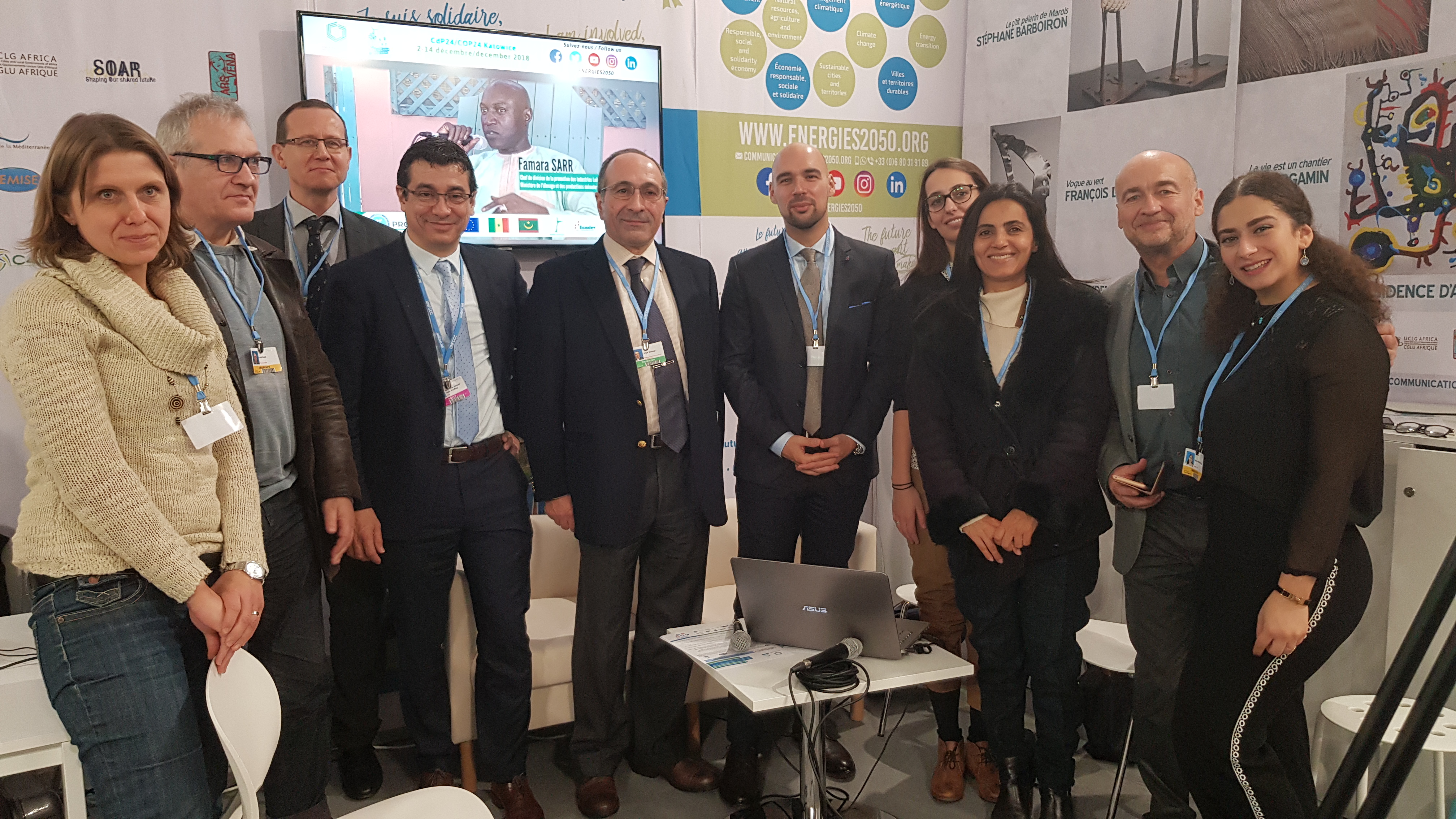
Panelists at the COP24 workshop by Union for the Mediterranean, IM, FEMISE and ENERGIES2050
The Deputy Secretary General of UfM agreed on the importance of Trade Integration as a priority theme in the South Med region, for climate action and in general to foster more partnership. He stressed how a 2012 UfM report on Trade Integration, carried out by FEMISE researchers Patricia Augier and Jean-Louis Reiffers, showed that 90% of trade within the EU was trade between EU countries, 9% corresponded to trade between the EU and the 15 partner countries, while trade between UfM partner countries represented only 1% of the total.
In conclusion, all panelists agreed on the importance of including all initiatives for climate action in a dynamic dialogue between stakeholders that is evolutive and gives a voice to policy stakeholders.
Make sure to also check our “IM-FEMISE COP24 Video Interviews”, conducted on the occasion of the events at Pavillon ENERGIES 2050 (11/12/2018 and 12/12/2018), organized by Institut de la Méditerranée (IM) , FEMISE, ENERGIES 2050 and the Union for the Mediterranean.
11/12/2018
The involvement of sub-national Euro-Mediterranean governments in the fight against climate change (Proceedings of COP24 Workshop)
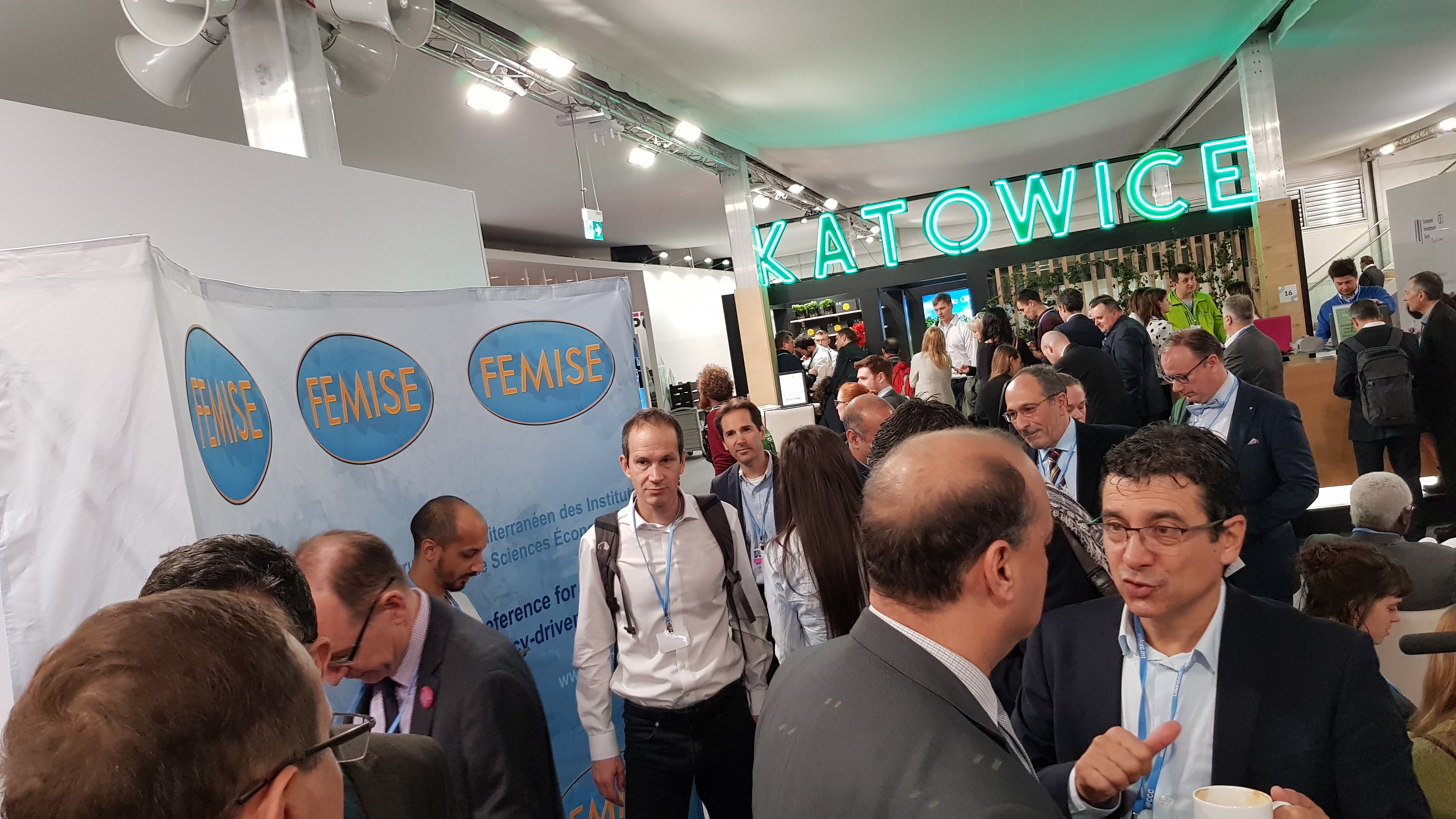
COP24, Katowice, Pologne, pavillon ENERGIES2050
On December 11 2018, during the 24th annual conference (COP24) on the fight against climate change (Katowice, Poland), a side event was organized jointly by the Union for the Mediterranean, Institut de la Méditerranée, FEMISE and ENERGIES2050 on the theme of “The involvement of sub-national Euro-Mediterranean governments in the fight against climate change”
This workshop brought together a panel of climate specialists, economists and political representatives to discuss the new report “Euro-Med sub-national governments in the fight against climate change: a framework for action, an example of the SUD Provence-Alpes-Côte d’Azur Region and opportunities for cooperation on a Mediterranean scale “. This study proposes a photograph of the context, the potential and some examples of actions of the Mediterranean territories in the face of climate change.

Constantin Tsakas (General Manager IM, General Secretary FEMISE), Jorge Borrego (Deputy Secretary General UfM), Magnus Berntsson (President of the European Assembly of Regions)
As mentioned in the report, the European framework allows regions to put in place effective strategies for resilience and in the fight against climate change, agreed Magnus Berntsson, President of the European Assembly of Regions. Meanwhile, according to Jorge Borrego, UfM Deputy Secretary – Energy and Climate Action, it is really at the regional level that climate action can succeed. Regions are the real drivers of action to bring about change and ensure the sustainability of initiatives that mediate between public authorities and local people. The priorities for Territorial Cooperation on Climate and Energy in the South Med region therefore lie in the creation of an environment allowing the proliferation of climate initiatives within a joint and coordinated action between actors at different levels and in different sectors.
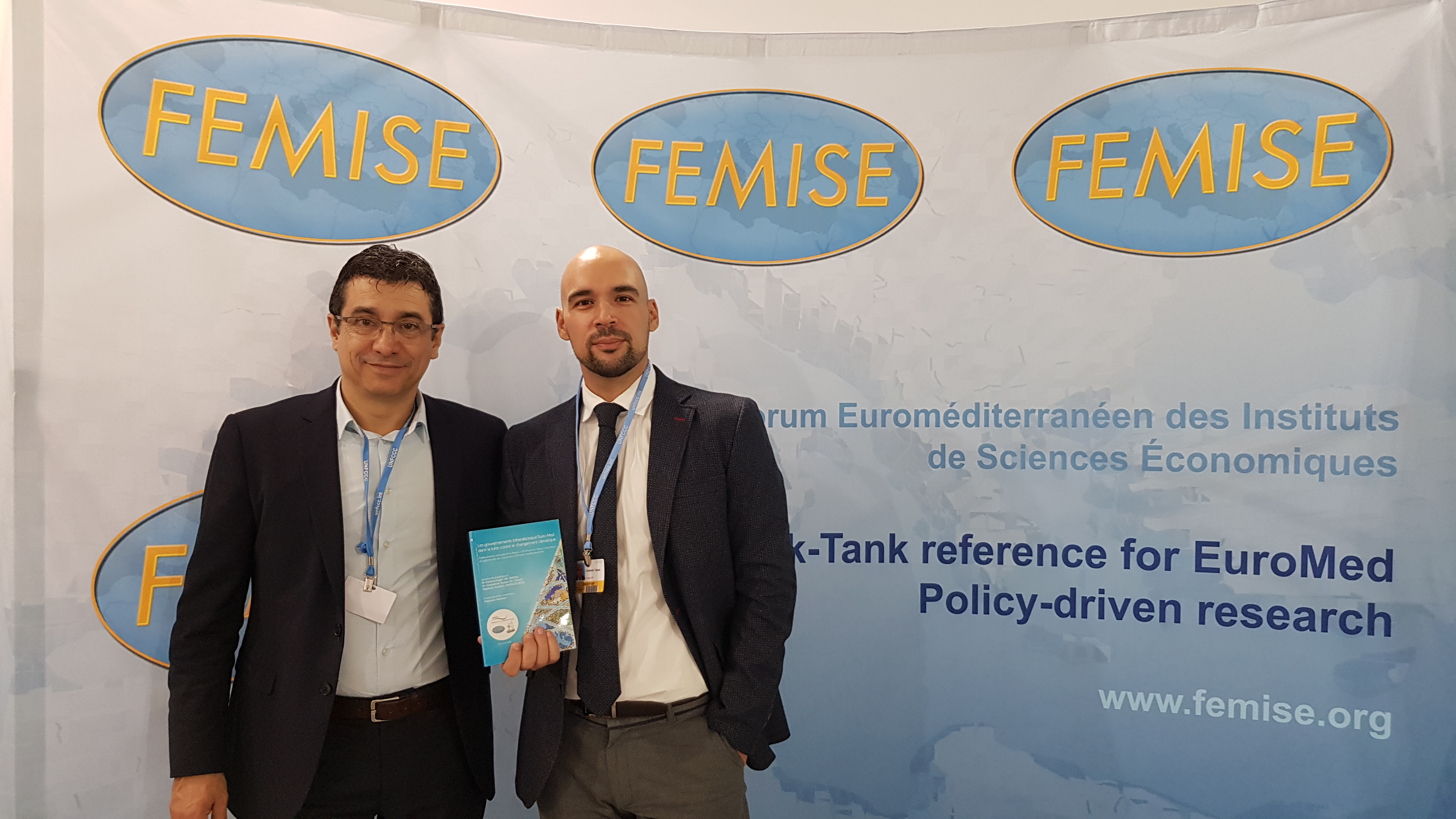
Stéphane Pouffary (ENERGIES2050) and Constantin TSAKAS (IM, FEMISE) presenting the IM/FEMISE/ENERGIES2050 study
“The SUD PACA region can serve as an example for other Mediterranean territories in order to capitalize on initiatives and share the experience of this region for a more effective fight”. Dr. Constantin Tsakas (General Manager of Institut de la Méditerranée, General Secretary of FEMISE), one of the publication editors of the study, described the usefulness of going back on the lessons that the case of the SUD region puts forward. A platform at the service of territories, offering the possibility to capitalize, to exchange, to train, to allow a dialogue with the world of regional statistics and to offer technical assistance, could be supported at the regional level. In addition, on the EU-Med level, private sector involvement could provide interesting answers. Among the proposed actions, the creation of an “ERASMUS of social and environmental entrepreneurship” to cultivate entrepreneurial skills with social and environmental impact especially with regards to young people.
Particular emphasis was placed on sharing and collaboration between the different stakeholders in climate action and resilience. Stéphane Pouffary, Director ENERGIES 2050 calls for “going beyond the fight against climate change to have a coordinated and positive struggle for well-being and sustainable development”. Moreover, as Magnus Berntsson pointed out, sustainable development and SDGs can not be detached from the NDCs and commitments of the Paris agreement. To treat them separately would be reductive and non-efficient. Thus, networking in the South of the Mediterranean would not only provide a better approach to the SDGs but would also have a positive impact on national climate commitments, a point shared by all panelists.
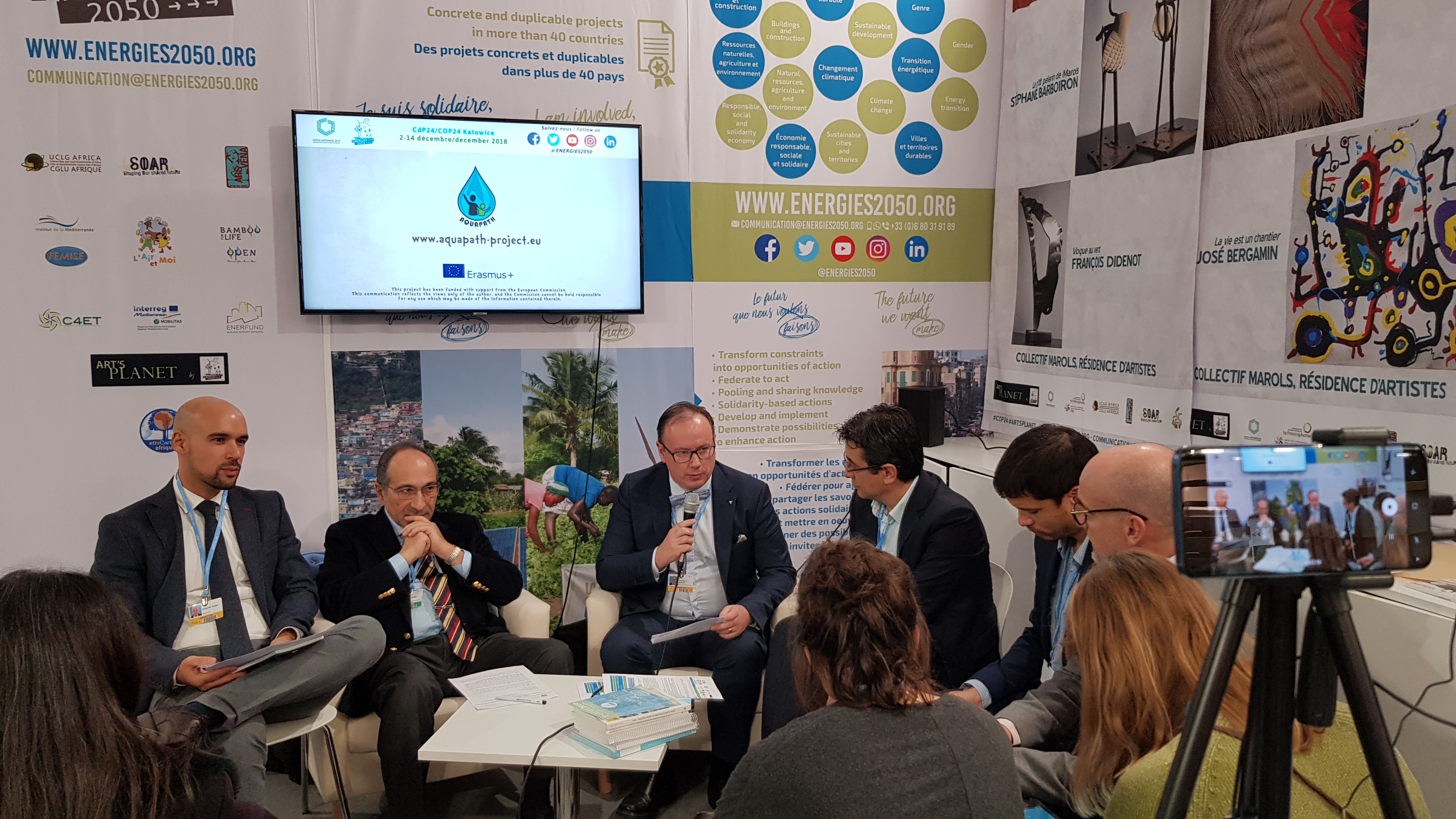
Panelists at the COP24 workshop by IM, FEMISE, Union for the Mediterranean and ENERGIES2050
To promote these climate initiatives and highlight the conditions for collaboration between the various stakeholders, it is essential to create a comprehensive legal incentive framework that supports private and public initiatives in their fight against climate change and capacity building of local societies. Jean-Charles Lardic, Director of Planning, City of Marseille, stressed the importance of providing a legal framework for Euro-Med cooperation, as the southern shore of the Mediterranean would greatly benefit from a rapprochement on the legal issues and legal framework for climate action.
The clarification of the legal frameworks for climate action in the South Med region would also make the region more attractive to foreign donors, thus providing more transparency and insurance for investments. Carlos de Freitas, Director of Programs, Global Fund for Cities Development, emphasized that to enable sustainable financing in the Mediterranean, expertise on climate issues needs to be strengthened at the state, general and territorial levels in particular.
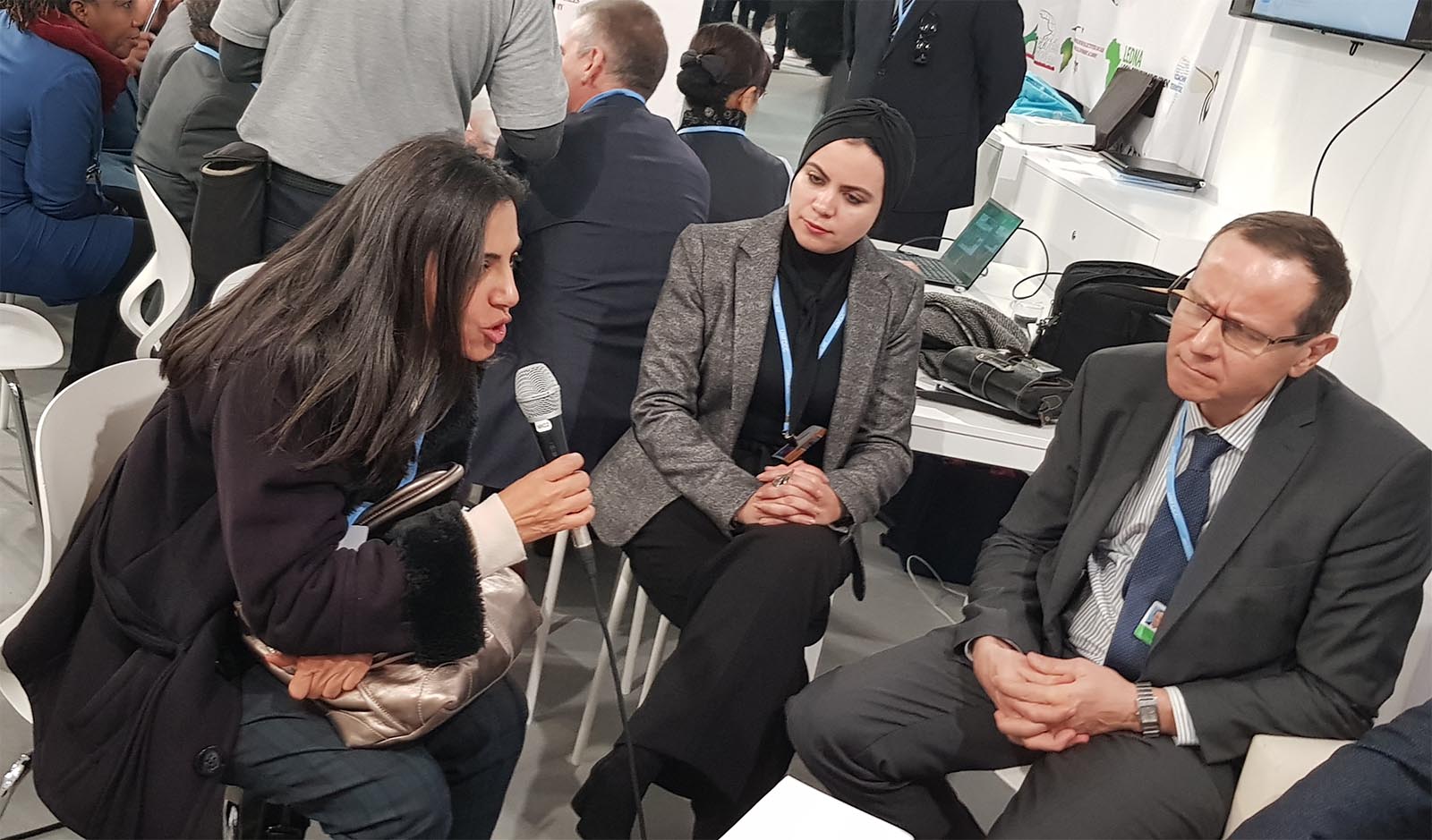
Abeer ElShenway (American University in Cairo, FEMISE), Hajar Khamlichi (Mediterranean Youth Climate Network) and Arnault Graves (Union for the Mediterranean)
In addition, the role of young people from the South Mediterranean region was highlighted during the debates that ended the workshop. The intervention of Hajar Khamlichi, President of the Mediterranean Youth Climate Network, emphasized that young people carry innovative solutions and projects with socio-ecological sensitivity that would create a real virtuous circle for a structural change from within the local ecosystems. Hence the need to support them in their social entrepreneurship project, a topic that was discussed during the presentation of possible solutions suggested by the report and presented by Guillaume De Laboulaye, ENERGIES 2050 expert and FEMISE member.
The report is available at: https://www.femise.org/publications/rapport_thema/rapport-les-gouvernements-infranationaux-euro-med-dans-la-lutte-contre-le-changement-climatique/
11/12/2018
COP24 : 3 questions to…Dr. Constantin Tsakas, General Manager of Institut de la Méditerranée – General Secretary of FEMISE
- Who are Institut de la Méditerranée and FEMISE?
Institut de la Méditerranée (IM, Marseille) is an institute of economics, founded in 1994 by the PACA Region, the General Council Bouches-du-Rhône, the City of Marseille City and the CCIMP. Its initial objective: to make Marseille a major center of reflection on the future of the Euro-Mediterranean zone by collaborating with Europe and the Southern Mediterranean countries. Therefore, IM produces research and actions to promote the development of the Mediterranean territories and to advance the Euro-Mediterranean territorial cooperation. This is also how IM and ERF (Economic Research Forum, Cairo) are co-founders and coordinators of FEMISE, a historic think-tank based in Marseille that brings together more than 100 research institutes from the North and South of the Mediterranean. FEMISE, funded in large part by the European Commission (DGNEAR) has a research agenda that revolves around four thematic axes: Trade Integration, Private Sector Development, Climate and Energy and finally Inclusiveness.
With our approach, which we consider as “Science for Policy” & “Science for Business”, we want to move towards inclusive and sustainable socio-economic development in the Euro-Mediterranean region. Through our research and multi-stakeholder dialogue, we are raising the awareness of state actors in the North and especially the South to the need to develop affordable and green energy by 2030 (SDG 7). In addition, our actions contribute to raising awareness on and acting for the implementation of other SDGs, in particular SDG9 “Industry, Innovation and Infrastructure” which is a key vector of economic growth and development. That is why we actively participate in THE NEXT SOCIETY project to support innovation in the Mediterranean. In addition, our actions respond to the issues of SDG10 “Inequalities Reduced”. Here, FEMISE and IM have undertaken an ambitious effort for the emergence of Social Entrepreneurship (ES) ecosystems, by associating the EU-MED cooperation communities with the main actors of social impact and support for entrepreneurship. We recently gathered some of these actors during a workshop, “Social Change Makers”, at the summit EMERGINGVALLEY2018 (Marseille, November 20, 2018).
- You stress that climate change is generating increased socio-economic complexifications in the Euro-Mediterranean region. What is the situation in the region and what answers do you hope to bring?
In the Mediterranean, climate change involves many risks for ecosystems and for the well-being of populations. The Mediterranean territories of Europe are the most vulnerable on the continent and the Mediterranean territories of the South and East of the basin are at the forefront at the world level. Therefore, we believe that it is first and foremost crucial to update and consolidate scientific knowledge on climate and environmental disturbances in the Mediterranean basin and to make them accessible to decision-makers, key stakeholders and citizens. That is why we are co-organizing a workshop with the Union for the Mediterranean and ENERGIES2050 (12 December 2018) which will allow to exchange between academics, practitioners and institutional representatives on ways to enrich the research program and the Euro-Med actions on climate change. By joining forces with the UfM, the reach of the messages for an impact on sustainable development in the Mediterranean can only be reinforced.
It should also be noted that the main challenges we encounter in the Mediterranean are i. the frequent absence of reliable data related to sustainable development and ii. limited interest in climate issues by the majority of public authorities in the South Bank. Thus in our strategy we wish to intensify our efforts on three axes:
- By continuing to fund research on Sustainable Development (SD) and Inclusive Strategies to be followed in the Mediterranean and on issues related to Climate Change,
- Contributing to the establishment of National Advocacy Panels in the South to act directly with policy makers,
- Contributing to the development of a SD Data Observatory on the Mediterranean.
We favor an inclusive multi-stakeholder approach and call on all concerned to contribute to this common effort. Sharing of resources and common knowledge is essential.
- With regard to knowledge sharing, you are presenting the study “Euro-Med Subnational Governments in the Fight Against Climate Change” at a second COP24 workshop. How does the SUD Provence-Alpes-Côte d’Azur region, illustrated in your report, offer examples for the EU-Med?
Indeed, another workshop, in collaboration with the same partners, will take place on December 11 and will present the study that the IM has carried in partnership with FEMISE and ENERGIES2050 on “The sub-national governments Euro-Med in the fight against climate change: Framework for action, example of the SUD Provence-Alpes-Côte d’Azur region and opportunities for cooperation on a Mediterranean scale “.
What we observe is that, globally, the action of communities, in France in general and in the SUD Region in particular, benefits from an incentive and coherent legal framework, which is supported by regional information systems provided, but also by the possibility of mobilizing many levers of European, national and regional funding. The communities of the SUD PACA Region have engaged in the implementation of integrated climate strategies in the form of PCET (Climate Territorial Energy Plans) and then PCAET (Climate Climate Air Energy Plans). Even if things still need improvement, the point of view that we defend in the study is that the SUD Region can therefore make a real contribution on the climate / territory issue in the cooperation strategy with the southern and Eastern Mediterranean territories.
Our reflections underline that the SUD PACA Region could bring valuable lessons and feedbacks, notably by bringing together the results of scientific research, decision-makers and the production of information and knowledge on local development / climate issues, which remains to be built in many countries. Moreover, a platform at the service of the territories in this area offering the possibility to capitalize, to exchange, to train, to allow a dialogue with the world of regional statistics and to offer technical assistance could be supported at the regional level, particularly through nascent initiatives such as the Mediterranean House of Climate.
Our study also emphasizes, more generally, on how the involvement of the private sector in EU-Med cooperation could provide interesting answers. Proposals for actions to be undertaken in the field of Euro-Mediterranean cooperation could include the creation of an “ERASMUS of social and environmental entrepreneurship” to cultivate entrepreneurial skills with social and environmental impact particularly with regard to the youth. Many other lines of thought are advanced in this study which was made available on December 7, 2018 on the FEMISE website.
Article in collaboration with ENERGIES2050 : http://energies2050.org/
09/12/2018
FEMISE and INSTITUT DE LA MEDITERRANEE (IM) partners in a third COP24 workshop! (December 13, Katowice, Poland)

FEMISE and INSTITUT DE LA MEDITERRANEE (IM) are delighted to join the workshop “Legal Transition, a dynamic of change initiated by local actors to help meet climate challenges in a vision of sustainable development based on a “humanistic vision””, organized by the city of Marseille and Energies 2050. Are also partners Barreau de Marseille, the Friends of the Universal Declaration of Human Rights, Green Cross France and Territories.
After giving a brief insight into the prospective and humanistic vision of the sustainable city of tomorrow, the objective of the workshop is to explore the question of Legal Transition. The workshop will allow presenting and debating the first workings of the Mediterranean Commission for Prospective Reflection on the Legal Transition which undertook to draw-up an overview of the legal evolutions considered necessary by local actors. The workings draw from the Universal Declaration of Human Rights and from the need to give territories more freedom to develop horizontal approaches and create new synergies.
Dr Constantin Tsakas, General of Institut de la Méditerranée and General Secretary of FEMISE will speak on the theme of “New inclusive and sustainable models of local development, which require revisiting legal frameworks”.
The program of the workshop is available (in french) by clicking here.
07/12/2018 (UPDATE)
Report “Euro-Med sub-national governments in the fight against climate change”
INSTITUT DE LA MEDITERRANEE (IM), FEMISE and association ENERGIES2050, announce the publication of the final version of the report on “Euro-Med sub-national governments in the fight against climate change: Framework for action, example of Région SUD Provence-Alpes-Côte d’Azur and opportunities for cooperation at the Mediterranean level “
This report, articulated in three chapters, offers a photograph of the initiatives and dynamics undertaken by Région SUD (France) in the fight against the effects of climate change and also fits within the framework of the great Euro-Mediterranean cooperation.
The report (in french) is available for download by clicking here.
07/12/2018
FEMISE and UfM collaborate on two COP24 workshops ! (11 & 12 December, Katowice, Poland)
FEMISE and Institut de la Méditerranée are thrilled to announce their collaboration with the Union for the Mediterranean (UfM) and ENERGIES2050 (member of FEMISE) on two COP24 workshops (Katowice, Poland) !
The programmes for the two workshops (December 11th and 12th) are available here (11/12) and here (12/12).
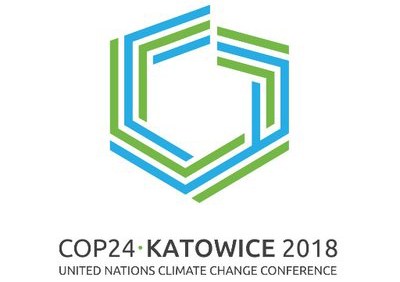
WORKSHOP 1 « The involvement of sub-national Euro-Mediterranean governments in the fight against climate change » (11/11/20118) : In the face of climate change, Europe’s Mediterranean areas are among the most vulnerable in the continent, and the southern and eastern Mediterranean territories of the basin are also at the forefront. The impacts of climate change are already costly, both economically and socially, and call into question the attractiveness of territories while challenging the European objectives for regional cohesion and inclusive growth in the countries of the South Bank.
This round table live-broadcast will be the opportunity to formally present the IM / FEMISE / ENERGIES 2050 study on “The involvement of sub-national Euro-Mediterranean governments in the fight against climate change: a framework for action, an example of Region SUD-Provence Alpes Côte d’Azur and opportunities for cooperation on the Mediterranean scale “. After a presentation of the issues and challenges but also opportunities to act, multi-stakeholder discussions (with representatives of the UfM, the President of the Assembly of European Regions, FEMISE experts, etc.) will allow an in-depth dialogue on Euro-Med cooperation dynamics. It will also be necessary to situate local climate governance in the broader context of Europe and the Europe-Mediterranean-Africa axis.
WORKSHOP 2 “Socio-Economic intricacies related to Climate Change Towards an EU-Med research agenda and actions” (12/11/20118) : In the Mediterranean, climate change implies numerous risks for ecosystems and for human well-being. Therefore, it is crucial to update and consolidate the best scientific knowledge about climate and environmental perturbations in the Mediterranean basin and to make it accessible to policy-makers, key stakeholders and citizens. The objective of this Broadcasted RoundTable is to exchange between academics, practitioners and institutional representatives on ways to enrich the EU-Med research agenda and actions on climate change.
Report “Euro-Med sub-national governments in the fight against climate change”
FEMISE is pleased to announce the publication of the report on “Euro-Med sub-national governments in the fight against climate change: a framework for action, an example of the SUD Provence-Alpes-Côte d’Azur Region and opportunities for cooperation at the Mediterranean scale.
The report (in french) is available for download by clicking here.
Press Release
December 7, 2018 – Report release
By INSTITUT DE LA MEDITERRANEE and its partners, FEMISE and ENERGIES2050
INSTITUT DE LA MEDITERRANEE (IM)[1] and its partners, FEMISE and association ENERGIES2050, announce the publication of the final version of the report on “Euro-Med sub-national governments in the fight against climate change: Framework for action, example of Région SUD Provence-Alpes-Côte d’Azur and opportunities for cooperation at the Mediterranean level “
This report, articulated in three chapters, offers a photograph of the initiatives and dynamics undertaken by Région SUD (France) in the fight against the effects of climate change and also fits within the framework of the great Euro-Mediterranean cooperation.
The first chapter deals with the “Framework for action of the Mediterranean territories of Europe in the face of climate change“. It underlines that subnational governments face many challenges in implementing an ambitious and integrated climate action. Issues of access to finance, capacity to design strategies adapted to territorial issues, relying on local data, action monitoring (MRV) and the need for support and framing from higher echelons of governance are crucial.
The second chapter deals with “The territorial response to climate issues in the Mediterranean: the example of the Région SUD“. The report notes that the action of local authorities, in France in general and in the Région SUD in particular, benefits from an incentive and coherent legal framework, which is supported by regional information systems provided. In accordance with the policies adopted at the national level, the communities of Région SUD have engaged in the implementation of integrated climate strategies in the form of PCET (Climate Territorial Energy Plans) and then PCAET (Climate Air Energy Territorial Plans). Beyond this process, there is a proliferation of initiatives aimed in particular at better involving all actors in climate action. However, the transparency of the results of these actions remains relatively weak.
The third chapter covers the theme of “Cooperations, territories and climate at the scale of the Mediterranean basin and beyond” and offers many tracks for reflection for the future. One of the first reflections revolves on placing the climate / territory issue at the center of the Euro-Mediterranean cooperation strategy. Région SUD could bring valuable feedbacks. In addition, a platform at the service of territories in this area offering the possibility to capitalize, to exchange, to train, to allow a dialogue with the world of regional statistics and to offer technical assistance could be supported at the regional level, in particular through emerging initiatives such as the Mediterranean House of Climate.
The growing involvement of the private sector could also generate relevant initiatives. Proposals for action on Euro-Mediterranean cooperation could include the creation of an “ERASMUS of social and environmental entrepreneurship” and a Mediterranean Initiative for Social and Environmental Finance, aligning business creation and capital flows with the objectives of reducing local social and environmental externalities.
This report is rooted in IM’s willingness to mobilize its network and partners to contribute to debates on a shared commitment to climate issues. It is also part of the follow-up on the background work on climate and territorial issues that has been carried out for years by ENERGIES 2050, particularly in the context of the development and implementation of low-carbon territorial strategies. In view of the follow-up given to the international event “Mediterranean of the Future”, organized by Région SUD (21 November 2017, in Marseille), IM, FEMISE and ENERGIES 2050 believe in the unifying capacity of our territory on these issues. This report also builds on the momentum generated by the workshop “Climate change in a Mediterranean in transition” (May 15, 2018, Marseille, co-organized with the Departmental Council of Bouches-du-Rhône), which allowed to illustrate territorial solutions for climate challenges in the Euro-Mediterranean region. The effective support of the Departmental Council of Bouches-du-Rhône has reinforced a real multi-stakeholder movement that has only strengthened this relationship. Exchanges with the services of the City of Marseille, particularly on issues of sustainable development and engineering of local governance, were also valuable.
This report is intended to become a regular publication.
It is available by clicking here.
It is also available on the website of ENERGIES2050.
For more information, please contact:
IM / FEMISE: Dr. Constantin Tsakas, General Manager of Institut de la Méditerranée, General Secretary of FEMISE c.tsakas@femise.org – + 33 (0)4 91 31 51 95 www.femise.org
ENERGIES 2050: Stéphane POUFFARY, General Manager of Association ENERGIES 2050 – stephane.pouffary@energies2050.org – +33 (0)6 80 31 91 89 www.energies2050.org
![]() This report was funded by IM, developed with the financial support of the European Union under the EU-FEMISE contract on “Support to Economic Research, Studies and Dialogues of the Euro-Mediterranean Partnership”. The content of the publication is the sole responsibility of the authors.
This report was funded by IM, developed with the financial support of the European Union under the EU-FEMISE contract on “Support to Economic Research, Studies and Dialogues of the Euro-Mediterranean Partnership”. The content of the publication is the sole responsibility of the authors.
[1] Founded in 1994 by the Regional Council Provence Alpes Côte d’Azur (PACA), the General Council of Bouches-du-Rhone, the City of Marseille, the Chamber of Commerce and Industry Marseille Provence
“Discovering Social Change Makers” : Social entrepreneurship as a key issue in the Mediterranean and Africa (November 20th, Marseille)
At the invitation of Institut de la Méditerranée and FEMISE, a dozen “Social Change Makers” involved in the Mediterranean region and Africa attended a workshop (Marseille, November 20th) during the Emerging Valley 2-day event. Their various experiences show the contribution of social entrepreneurship as a vector of socio-economic development accelerator but also its difficulties in imposing itself.

Entreprises with social impact as a vector for accelerating socio-economic development (photo : F.Dubessy)
MEDITERRANEAN / AFRICA. “Necessity is the mother of invention, so you have to try to change things with creativity.” Founder and CEO of Yomken.com Tamer Taha immediately set, during the workshop “Discovering Social Change Makers in the Mediterranean and Africa”, the problem of a “Mena region lagging behind in terms of innovation compared to other countries at the same level of development. “
Set-up by Institut de la Méditerranée, Femise and IRD (Research Institute for Development) on the occasion of Emerging Valley (Marseille, November 20, 2018) this meeting aimed to highlight the existing social entrepreneurship initiatives in Africa and in the South Mediterranean countries. As Constantin Tsakas, General Manager of Institut de la Méditerranée and General Secretary of Femise, says, “in the face of youth unemployment, the informal economy, inequalities and lack of economic diversification, social impact enterprises have the potential, that is poorly exploited, to be an accelerator of socio-economic development by taking advantage of innovative approaches. “
For Egyptian entrepreneur Tamer Taha, “innovators need more than just money and the market needs more than new ideas, and if we do not innovate, we risk going out of the international market.” With Yomken.com, an open innovation platform for industrial, environmental and social challenges, Tamer Taha connects large companies and SEs-SMEs in five countries to answer problems through calls for solutions. Since 2012, these synergies have resulted in sixty-eight challenges. One of them being the case of a German vegetable cutting machine from a Cairo company that could not process a local vegetable called okra. For $ 5,000, two young engineers managed to solve the impasse.
Strengthen African start-ups

Hatoumata Magassa networks four African incubators (photo: F.Dubessy)
Shadi Atshan co-founded in 2017 an accelerator for social enterprises (SEA) in Palestine. It hosts about forty start-ups and two incubators. In 2018, he went international with four projects in Jordan. “As the market is limited, these start-ups are of little interest to investors, so we help them to raise funds,” says Shadi Atshan. Hatoumata Magassa intervenes to “contribute to sustainable, inclusive and digital economic development in Morocco, Burkina Faso, Senegal and Ghana.” Coordinator of AFIDBA (AFD for Inclusive and Digital Business in Africa) – Bond’Innov (Bondy in France), she takes care of this project financed by the French Development Agency (AFD) for 2 M € to support sixty start-ups with a strong social impact and a funding scheme allocated of € 500,000.
“We are structuring and strengthening a network of incubators in our four intervention countries to strengthen African start-ups” said Hatoumata Magassa.
Natalia Resimont coordinates the “Women of the World” project of the French NGO “Quartiers du monde”, a network of solidarity entrepreneurs present in Burkina-Fasso, Madagascar, Morocco, Mali and Senegal. “We create pedagogical tools to integrate the gender perspective, without which the social and solidarity economy does not deconstruct gender inequalities and ignores a series of models and structures that maintain, update and replicate the patriarchal system : the sexual division of labor governance, violence against women, hegemonic masculinities … “, she says. The NGO has published a guide in Spanish and French (and soon in Arabic and English), the result of five years of work on the issue.
Create collaborative civil societies
” To lead real economic initiatives, these women must first rebuild. We are integrating this into our support “ says Natalia Resimont, for example,” Women of the World “created an incubator in a small town in Mali rather than in a big city to address the issue of women’s mobility.
In Lebanon, Natalia Menhall of Beyond RD, a group of activists for the development of social entrepreneurship, advocates for “building inclusive governance systems and inspiring innovative policy solutions.” With the objective of “building collaborative civil societies and human-centered partnerships in line with priorities, by providing learning opportunities for individuals, institutions and communities.”
According to her, “even if the concept is new, the phenomenon is already present in the MENA region thanks to an existing culture of solidarity and social consciousness.”
A factory of initiatives

Sihle Tshabalala and Natalia Menhall are involved, each in their own way, in removing obstacles to social development (photo: F.Dubessy)
“Instead of waiting for the changes to come to us, we decided to have an active role,” insists Natalia Menhall. “Social entrepreneurship is a tool that comes to the citizen to propose solutions that can be generalized,” she said, noting that after a study in seven countries in the MENA region, “the obstacles to the development of Entrepreneurship remain very close, either the tools do not exist, or they are not adapted or concentrated in urban areas. “ Beyond is developing a Master’s program in Social Entrepreneurship. “In some countries, bankers have to go from purely economic profit to social profit,” she says.
Sihle Tshabalala is interested in disadvantaged youth born in the townships of South Africa. He knows her well to come from there. During a stay in prison, he got interested in computer coding and then put in place a learning method for academics to teach this illiterate population and train coders.
Director of Inter-Made, a social incubator based in Marseille and dedicated, since 2001, to projects with social and environmental impact, Cédric Hamon offers skills, training and networking to start-ups. “We also have a factory of initiatives because all social needs do not always find a start-up to solve them,” he says while he sets foot on the other side of the Mediterranean in Tunisia. Cédric Hamon even markets a training offer on the resolution of societal needs through entrepreneurship. “The obstacle is that you sell solutions to people who did not understand that there was a problem … So you create another problem at home,” he admits while stating, “We do not run out of funds, we do not miss projects, we lack funded projects. ” What remains, as Constantin Tsakas indicates, is that “a social project remains difficult to market.”
The Instagram of Waste

Constantin Tsakas, organizer and moderator of this workshop, is aware of the difficulty of selling social entrepreneurship (photo: F.Dubessy)
Another angle was also given by Mouhsin Bour Qaiba. Everything starts from a statement of the co-founder of Clean City: In Casablanca, each resident generates one ton of non-recycled waste per year. This Moroccan creates what he calls “the Instagram of waste” to put pressure on the authorities and launches an application for sorting at the source with possibility of ordering bags of different colors to ease the process of recycling.
Since then, Clean City has conquered other countries. His CEO is now thinking of giving Token (cryptocurrency) to citizens who report problems posted on his site instead of points allowing discounts on purchases as currently. “We now have 20,000 active users worldwide and 14,000 claims generated, and our goal is to reach 2 million active users,” said Mouhsin Bour Qaiba.
“We wanted to show faces, men and women and insist on the ordinary aspect of their lives.” Roman-Oliver Foy, president of Friends of the Middle East (France, Lebanon), has been presenting initiatives of social entrepreneurs in the Arab world for two years through conferences and debates.
In the near future, he will be launching ten-minute videos on these experiences with the goal of inspiring potential entrepreneurs in the South and North and raising awareness among policy makers while promoting the diffusion of innovations. “Policy makers need to see what a social and supportive entrepreneur is,” he insists.
Subscribe to the Econostrum newsletter : http://www.econostrum.info/subscript
Also check the article and video coverage by ECOMNEWSMED on the workshop :
Med Change Makers e06 : Alexandra FLAYOLS, Education & Integration of the Marrakech youth

FEMISE recently launched its series of interviews called « Med Change Makers ».
« Med Change Makers » are text and video-based interviews that allow dynamic researchers of the FEMISE network to illustrate how their research addresses a policy-relevant question and how it contributes to the policy-making process in the Euro-Mediterranean region.
The key role of education in the professional integration of young people in the Marrakech region
Interview with Alexandra Flayols, Université de Toulon, FEMISE
FEMISE recently published the Policy Brief « The key role of education in the professional integration of young people in the Marrakech region »
Author of the MED BRIEF, Dr. Alexandra Flayols highlights the important role of secondary education in gaining access to paid employment. However, many young people drop out of school early. The analysis of reasons for stopping studies is essential so that public authorities can put in place effective measures. Interview :
1. In this policy brief, early-stage obstacles to the professional integration of young people are explored, notably regarding access to education. However, aren’t there other key factors hindering this insertion? So why is it more optimal to invest in education?
Education is obviously not the only factor influencing the professional integration of young Moroccans. Several studies have highlighted the existence of other factors that can constrain the professional integration of young people. These factors may include previous work experience, the young person’s financial situation, mobility, the socio-professional category of the parents, active labor market policies, etc.
Regarding the factors that can more specifically be attached to the Moroccan case, the place of residence may for example hinder the professional integration of the youth. The region of Marrakech-Tensift-Al Haouz (MTH), which is the subject of this study, is mainly rural (198 rural communes against 18 urban). Although the OCEMO survey (2008) used in this work does not allow to distinguish the place of residence due to lack of data, our results show a differentiated impact of the level of education in urban and rural areas. In addition, the lack of job creation in the private sector, despite the lower dynamic demand for workers in the public sector, which until the 1990s was the largest employer of skilled workers, generates additional insertion obstacles.
We have chosen to focus on education because besides the fact that it is a determining factor of professional integration, it is a central issue in Morocco where education is experiencing considerable difficulties. Moreover, the fact that having a degree does not constitute a protection against unemployment in Morocco, contrary to the case of developed countries, pushes us to pay particular attention to this problem. Investment in education has become a standard in developed countries, however, while it is important for economies to move up the international value chain, it is not a sufficient condition in the access to employment. The match between trainings, formations and the job market is thus particularly important. The quality of education is also paramount and is highly criticized in Morocco.
2. What are the main reasons you have identified to explain why young people quit their studies in Morocco?
The first reason that pushes young Moroccans to abandon their studies is financial (23%). It is followed by lassitude (21%) and poor school results (15%).
The reasons for dropping out of school are indicative of the difficulties encountered in the education system and may also allow public authorities to target their interventions. Thus, by grouping the different reasons for dropping out according to whether they are voluntary or involuntary, we have seen that 60% of young people are quitting schooling; this rate even reaches 67% in rural areas. We observed other disparities by place of residence, but also by gender. Young girls in rural areas are thus more likely to be refused by their parents the right to peruse their studies (12% versus 6% in urban areas). The distance from school is also an important reason for stopping studies since it concerns 19% of young people in rural areas compared with just 4% in urban areas.
3. You mentioned that reaching the secondary education level is an important pre-requisite for young people, both to improve their probability of continuing their studies and their chances of being better inserted professionally. So what do you think is the best way to make secondary education more attractive to young people?
One of the first ways that could be implemented concerns the quality of education which, as we saw in the previous question, could be a means of encouraging young people to continue their studies. In recent years, private schools have experienced a significant growth in Morocco yet, their quality remains questionable and their high tuition fees reinforce the inequalities in access to education between students of wealthy families and those from a more modest social background.
The quality of education concerns its content as well as the supervision and creation of new schools. The language of learning, for example, causes significant difficulties for some young Moroccans. French, which was considered a foreign language, is now used as the language of instruction in higher education for science and economics. Thus, the orientation of young people who do not have the expected level in French is then constrained.
It is also essential to pay particular attention to the opportunities of the sectors proposed, whether for general education or vocational training. This could be an additional motivation for young people to continue in these streams. Finally, the establishment of bridges in the education system could also reduce the number of drop-outs as young people may be able to reorient themselves more easily.
4. As you pointed out, some schooling drop outs are involuntary. What recommendations would you give the public authorities to limit these cases or at least to facilitate the transition of these young people to the workplace?
Among the involuntary reasons for stopping studies, the financial reason is the most important. These results indicate that there is considerable room for maneuver to improve the retention rate of youth in the MTH region. Although the reforms of the late 1990s have improved access to education, it is still limited in rural areas, especially for young women. It is not necessarily about increasing spending on the education sector, but about better targeted measures such as the Tayssir program. The latter aims to reduce absenteeism by granting scholarships to hard-working students from the poorest households. The pilot phase in some rural communes shows positive results, particularly in the highest levels of education. Our results have shown that a woman with a level of education at least equal to secondary school is 1.7 times more likely to have access to a paid job yet, women’s access to education is particularly constrained in rural areas since they are 1.4 times less likely to have access to secondary education than women in urban areas. Measures targeting this subpopulation would therefore be beneficial.
In addition, the hypothesis of a lack of supervision or teachers or inappropriate content of lessons could explain the lassitude felt by young people as well as their academic failure. The quality of teacher training should therefore also be at the heart of the Moroccan government’s concerns. The congestion rate of sophomore class rooms is also high; therefore, less overcrowded classes would, with no doubt, favor better learning conditions.
Lastly, to facilitate the transition to the workplace, partnerships with companies could be envisaged, particularly with regard to vocational trainings. This would make it possible to better target the needs of the labor market like the SIVP in Tunisia. These partnerships could be accompanied by measures to encourage the hiring of these young people whom the company would have contributed to the training.
5. Are there not different trends in the length of studies and different mechanisms behind the professional integration of young women and men? Would that imply separate recommendations by gender?
Although access to education has improved for women, there are still disparities. We do not have precise data on the duration of studies by gender. However, estimates by Barro and Lee (2010) find a gap of 1.67 years in average length of schooling. In addition, parents’ refusal to continue studying is an important reason for young women’s drop outs, especially in rural areas. The pursuit of education for young women therefore seems more constrained than that of men.
Moreover, dropping out could also correspond to the desire to create a family which is a motive mentioned only by young Moroccan women and never mentioned by men. This choice necessarily has an impact on the professional integration of women either because of a too low level of education if they dropped out of school too early or because of the hard reconciliation between their family responsibilities and their professional life.
Mechanisms targeting professional integration should be differentiated by gender. For example, studies show differences both in the implementation of employability strategies and in the exclusion of certain professional spheres. If the authorities wish to improve young women’s access to the labor market, particular attention should be paid to them.
[1] Stage d’Initiation à la Vie Professionnelle.
The MED BRIEF is available for download by clicking here.
Interview by Constantin Tsakas
![]() This activity received financial support from the European Union through the FEMISE project on “Support to Economic Research, studies and dialogues of the Euro-Mediterranean Partnership”. Any views expressed are the sole responsibility of the speakers.
This activity received financial support from the European Union through the FEMISE project on “Support to Economic Research, studies and dialogues of the Euro-Mediterranean Partnership”. Any views expressed are the sole responsibility of the speakers.
Income Convergence and the Impact of the Euro-MED Trade and Financial Integration on Macroeconomic Volatility
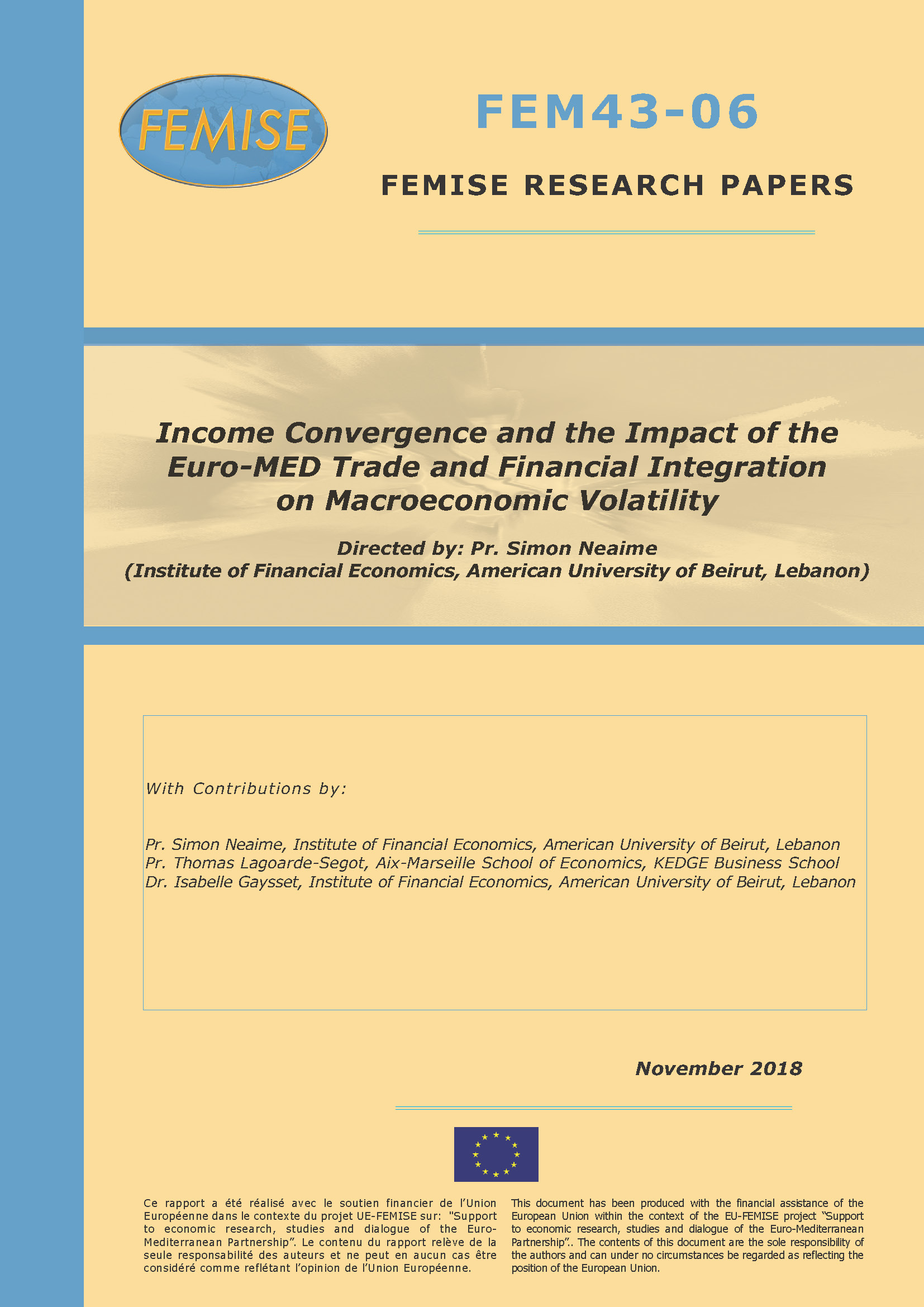 Economic and financial integration efforts between the Mediterranean Partner (MPs) countries and the European Union (EU) were initially introduced by the Cooperation Agreements, which granted total exemption from tariffs on industrial products. These efforts were subsequently enhanced by the Association Agreements that were launched under the Barcelona declaration of 1995, which resulted in MPs reducing or even eliminating tariffs on European industrial imports. At the same time, MPs have opened up considerably to other countries, either under the framework of the EU-Mediterranean (MED) trade agreements, or in the context of widespread reduction in tariffs through the signing of the World Trade Organization (WTO) agreements. In early 2000, the Barcelona Process was replaced by the European Neighborhood Policy (ENP), which then was revised in 2015 and became the New European Neighborhood Policy. It is under this framework that the economic relations between the EU and their MPs are now being reshaped.
Economic and financial integration efforts between the Mediterranean Partner (MPs) countries and the European Union (EU) were initially introduced by the Cooperation Agreements, which granted total exemption from tariffs on industrial products. These efforts were subsequently enhanced by the Association Agreements that were launched under the Barcelona declaration of 1995, which resulted in MPs reducing or even eliminating tariffs on European industrial imports. At the same time, MPs have opened up considerably to other countries, either under the framework of the EU-Mediterranean (MED) trade agreements, or in the context of widespread reduction in tariffs through the signing of the World Trade Organization (WTO) agreements. In early 2000, the Barcelona Process was replaced by the European Neighborhood Policy (ENP), which then was revised in 2015 and became the New European Neighborhood Policy. It is under this framework that the economic relations between the EU and their MPs are now being reshaped.
The New European Neighborhood Policy provides a robust platform towards financial assistance through deeper financial integration, greater access to the common market, and better institutionalization of trade and financial relationships. The EU is also proposing a Deep and Comprehensive Free Trade Area (DCFTA) that will address agriculture, services, and non-tariff measures. Negotiations for the DCFTA are underway with Morocco and Tunisia. Within the context of this New European Neighborhood Policy and the role of the EU in facilitating the modernization, the transition, and international openness of the Mediterranean countries, this research study assesses the degree of income convergence between the two groups (EU and MED) resulting from those trade agreements, as well as macroeconomic volatility effects of those policies on a selected sample of MPs, in order to identify the winners/losers form these trade agreements.
This said, in this study, we use in a first stage the concepts of s-convergence and b-convergence to evaluate empirically income convergence among a group of EU-MED countries over the period 1980-2015. We then present a thorough empirical analysis of the implications of the Euro-MED partnership agreements on economic growth and on macroeconomic volatility in a sample of MPs. Because of the initiation of the Barcelona Process and the Neighborhood Policy in 2000, the empirical analysis is carried out sequentially, over 5 and 10-year periods, and then for the period as a whole 1980-2015. The empirical findings show that there is weak evidence of income convergence for a group of EU-MED countries when analyzed in 5- or 10-year subintervals from 1980-2000 in single equation cross section regressions. However, we find statistically significant evidence of real per capita GDP convergence either when the whole sample period 1980-2015 is analyzed or when the 10-year sub-periods are pooled and estimated in panel growth regressions. These are more plausible results both because economic growth and convergence are long run phenomena and because panel methods deliver more efficient parameter estimates. For the period 1980-2000, there is evidence of weak conditional income convergence in the group of EU-MED (16) countries, and this evidence becomes much weaker for the MED group of countries in between 2000-2015. The reason for these results is the negative effects of the European financial and debt crises on the Euro-MED region in general, and on the MED region in particular.
Macroeconomic stability and economic openness turned out to be statistically important factors and have the expected positive effect on economic growth in the MED countries. Indeed, in most of the estimated models, the variable that is consistently the most significant is economic openness. Of the other explanatory variables, population growth has the theoretically expected negative effect on economic growth as it is found in other studies on empirical growth. Government spending also had a negative effect on economic growth and is statistically significant as is population growth.
The main policy implications that emerge from the empirical results of this paper is that if the MED countries wish to achieve high economic growth they should pursue policies that further promote free trade and economic openness with the EU, as well provide an anchor of macroeconomic stability by means of policies that keep fiscal and monetary policies under control. Political and social unrest, as well as, financial and debt crises have a negative effect on economic growth and convergence in the region and, if possible, should be dealt with as soon as possible by appropriate political and macroeconomic policy action.
Other empirical results point to the fact that MED countries may be less susceptible to EU’s financial shocks if the domestic MED market is larger and/or more regulated. This is consistent with what economic theory would suggest and it has policy implications. In reality, some MED countries have chosen to impose capital controls to deal with financial market crises since it appears that the “culprit” is international capital flows although this policy practice may have undesirable long-term economic consequences. We have shown that MED countries should improve their macroeconomic and financial policy coordination to cope effectively with the impact of greater trade and financial integration with the EU. This may be achieved for example through enhancing regional economic and financial integration. The establishment of a MED free trade zone will not only stimulate and enhance growth, but will also enhance intra-MED trade, thereby, reducing considerably the exposure to the EU’s business cycle, and controlling for the excessive exposure of these MED small open economies to macroeconomic developments in the EU.
The literature shows that large economies can better absorb and neutralize the effects of external shocks. Controlling for the effects of shocks, however, is particularly more difficult in the case of the developing MED economies, which are smaller in size and nearly dependent on exports to the EU of very few commodities and on the import of a huge number of commodities. A direct consequence of an integrated capital market within the MED region will be to reduce the risks associated with greater EU-MED integration, and to dampen the vulnerability of MPs, especially those with high levels of debt, such as Lebanon, Jordan and Egypt, to the effects of fluctuations in EU’s interest rates. A larger MED financial market would lower the cost of raising capital, and would allow MED governments to service their huge debt at lower costs on one hand, and MED firms to rely more on the local market rather than tapping EU’s markets to raise capital, on the other. Lower costs of raising capital will subsequently translate into more investment, consumption, and GDP growth rates in the region. The MED region should accelerate the process of trade, financial, and economic integration with the EU in order to better absorb the negative effects of external political, financial and/or economic shocks. Efforts should also be exerted to speed up the implementation of the fiscal and monetary reforms so as to improve the inflow of portfolio and FDI into the region.
In short, for further trade and financial integration with the EU, MPs need to individually devote more efforts to pursue sound macroeconomic policies. This should be coupled with institutional reforms aimed at developing the financial sector in the respective MED economies. Subsequently, MPs should try to integrate horizontally while at the same time opening up further vertically (to the EU). It was shown that financial openness- as measured by gross capital flows as a ratio to GDP- is associated with an increase in consumption volatility, contrary to the notions of improved international risk-sharing opportunities through financial integration. The inherently unstable macroeconomic environment, political and military turmoil, as well as unsound monetary and fiscal policies in the MED region may explain this empirical irregularity.
One policy recommendation of the study is that MPs need to be more, not less, integrated with EU’s financial markets to be able to reap the benefits of financial integration in terms of improved risk sharing, and consumption smoothing opportunities. This conclusion will however require further analysis, as regional financial integration is associated with a variety of risks in the EU-MED region. To minimize these risks, MPs would need to implement sound macroeconomic and structural frameworks in tandem with further integration. For example, our findings have emphasized the role of sound fiscal and monetary policies in driving macroeconomic volatility. In regard to structural reforms, the development of the domestic financial sector is critical, as a high degree of financial sector development is associated with lower macroeconomic volatility.
Finally, the New European Neighborhood Policy provides a robust framework towards trade and financial assistance through deeper financial integration, greater access to the common market and better institutionalization of trade and financial relationships between the MED and EU countries. This research project will assist policy makers and academics in the EU and MED regions in redefining their trade, financial and macroeconomic priorities while designing new European Neighborhood Policies that will respond to the recent economic challenges. The new European Neighborhood Policy will spawn a large amount of literature on its consequences. This study constitutes an integral part of that literature by identifying the common and differing strands of analysis with particular emphasis on the changes made in the macroeconomic policy paradigm in both the MED and EU region.
FEMISE had the pleasure of co-hosting a workshop on “Sustainable Finance” at SDSN-France with Prof. Jeffrey Sachs (13 November, Paris)
FEMISE was pleased to be part of SDSN-France launch in Paris on the 13th of November 2018.
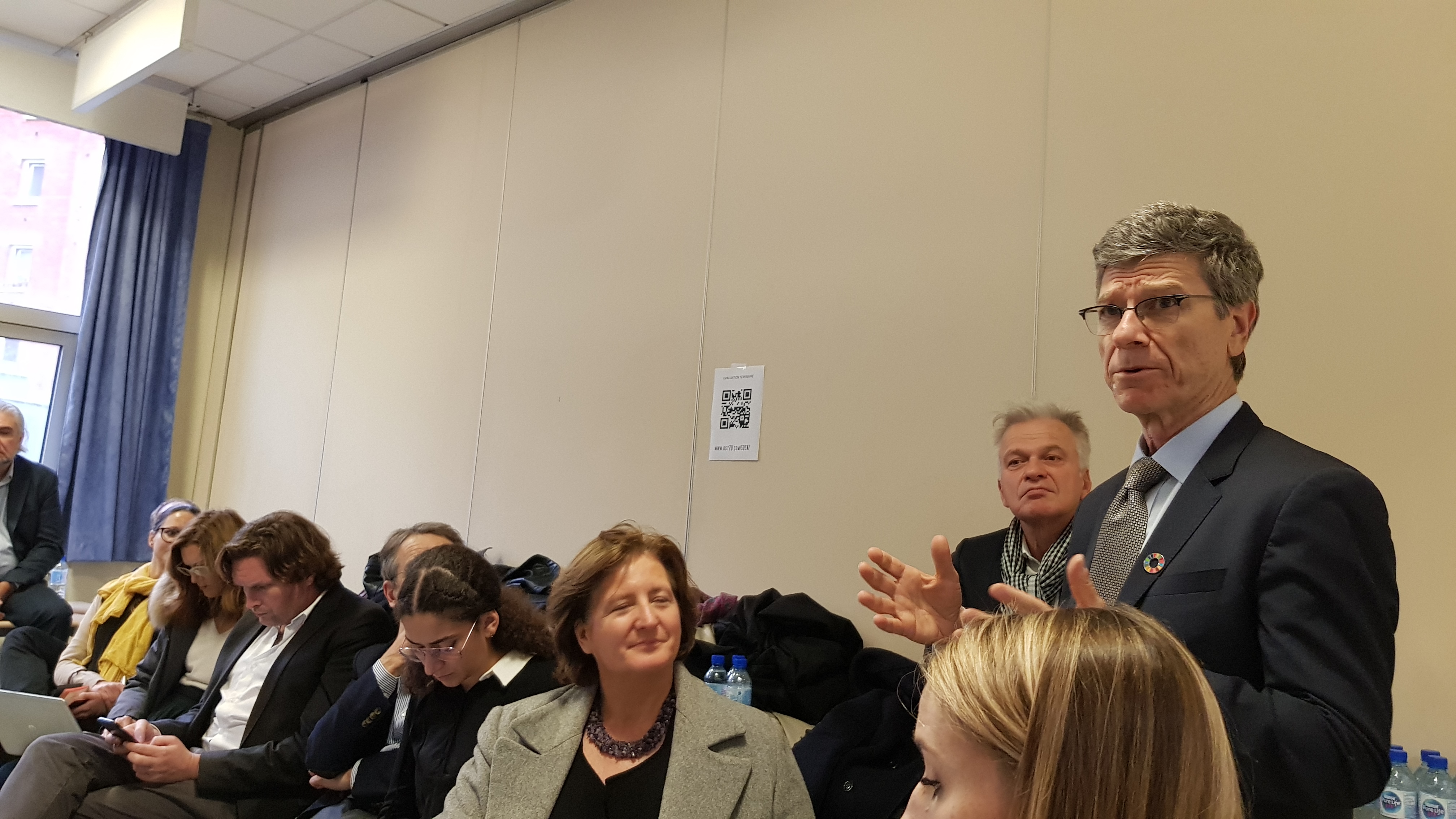
Pr. Jeffrey Sachs (SDSN, Columbia University)
The UN Sustainable Development Solutions Network (SDSN) aims to gather a large number of leaders from all regions and diverse backgrounds in order to promote practical solutions for sustainable development, including the implementation of the Sustainable Development Goals (SDGs) and the Paris Climate Agreement. This network has been operating since 2012 under the auspices of the UN Secretary-General and bases its action on values of joint learning and integrated approaches towards interconnected economic, social, and environmental challenges.
The launch of SDSN-France is a key event for the network in general because it allows it to have valuable partners form the academic and research field in France articulating the collaboration between multilateral actors and local financing institutions, the private sector, and civil society. The office of SDSN-France will be driven by KEDGE Business School, member of FEMISE network, the University of PSL, the Pierre et Marie Curie University and Cergy-Pontoise University.
The event was extremely rich in presentations, forward-thinking discussions and proficient workshops. These workshops took the form of collective intelligence sessions where the diversity of the backgrounds of the participants allowed a broad understanding and holistic approaches to the issues discussed. Constantin Tsakas, Secretary General of FEMISE and General Manager of Institut de la Méditerranée, was a host in the workshop “Sustainable Finance”, organized by KEDGE Business School. Alternative and green financial tools were discussed during this workshop, along with determining the key objectives and responsibilities of the French branch of SDSN, as an unavoidable stakeholder in the debate of concretization of the SDGs. Questions brought up by Professor Jeffrey Sachs (Professor at Columbia University, special consultant UN Secretary General) such as the means by which the evaluation of projects in the context of systemic transformation can be possible or the standards to apply for ESGs (Environmental, Social and corporate Governance), pointed out the richness of this matter from a conceptual point of view but also the important practicality of this issue.
In his recap of the workshop, Professor Thomas Lagoarde-Segot (Associate Professor of Economics and International Finance at KEDGE Business School and FEMISE researcher), stressed on the role of SDSN as a mediator between the different actors of Green Finance and more particularly as a gateway between the academic world and research, on the one hand, and the practitioners, on the other. An approach in 3 steps, that included FEMISE proposals, was retained by the participants: To achieve SDSN-France’s full potential, the network could act on 3 levels; the macro-level by raising awareness towards policy-makers, the meso-level by allowing the emergence and mapping of structures (financial, technical) that support social impact and on the micro-level by helping social entrepreneurs improve their perception of Green Finance and their access to it.
These findings were then exposed during a plenary session with the presence of the SDSN-France board and will be included in the roadmap of this French branch of the network, under the section “Sustainable Finance”, alongside the other key findings of the different workshops tackling subjects as diverse and essential as “Education for Sustainable Development”, “Sustainable Cities”, “Sustainable Value Chains”, “Energetic transitions” and leads toward enhancing the “Solutions’ agenda” for SDGs in France. All of these workshops stressed the crucial role of SDSN-France as a facilitator of collaboration between stakeholders and of an accelerator of academic and intellectual effervescence towards finding practical and adequate solutions to concretize SDG goals.
“Precipitating the change of the system as a whole” was one of the focal points of Professor Jeffrey Sachs during his keynote speech at the Chimie ParisTech. It is not about addressing each issue as an independent issue but about “kedging” the world towards change and towards cooperation and alternative ways of governing.
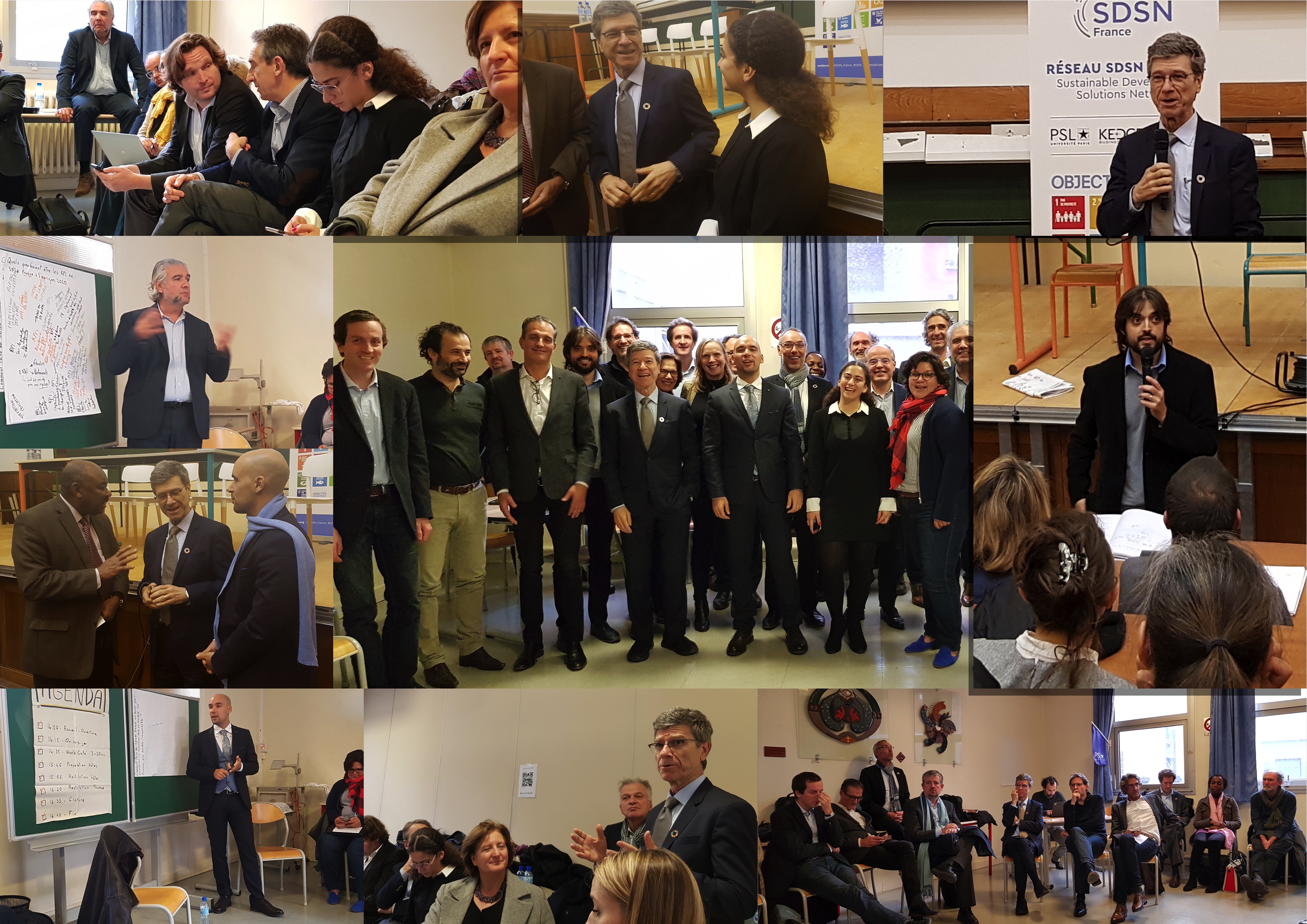
FEMISE at the launch of the SDSN France office, co-piloted by KEDGE (November 13, Paris)
FEMISE is pleased to invite you to launch of the french office of the Sustainable Development Solutions Network (SDSN) of the United Nations.

Prof. Jeffrey Sachs
The SDSN France office is co-led by KEDGE Business School, a member of the FEMISE network, and by the Pierre and Marie Curie University.
A Keynote Speech from Prof. Jeffrey Sachs (Professor at Columbia University, Special Consultant to the UN Secretary-General) will inaugurate the launching conference on November 13th at Chimie ParisTech.
In addition, KEDGE Business School will organize a “Sustainable Finance” brainstorming Workshop during the inaugural conference of this network. The participants in the workshop organized by KEDGE Business School originate from the academic, institutional and corporate worlds, and have been identified as key actors of change for the refoundation of financial models and practices in response to the challenges of ecological transition.
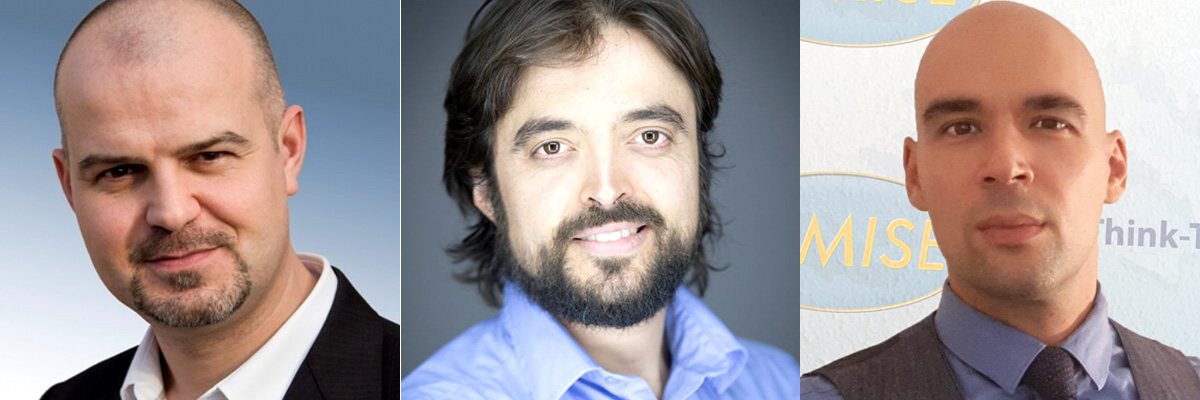
Jean-Christophe Carteron, Thomas Lagoarde, Constantin Tsakas
Among the panelists, Jean-Christophe Carteron (CSR Director at KEDGE Business School), Pr. Thomas Lagoarde (Associate Professor of Economics and International Finance at KEDGE Business School and FEMISE researcher) and Dr. Constantin Tsakas (General Manager of the Institut de la Méditerranée, General Secretary of FEMISE).
 The workshop will take the form of a collective intelligence session led by a specialized speaker. The findings of this workshop will be presented in the plenary session in the presence of the steering committee of SDSN France, and will constitute the roadmap of the sustainable finance component of SDSN France. Sign up for the launching conference : https://www.weezevent.com/journee-de-lancement-reseau-sdsn-france-13-novembre-2018-conference
The workshop will take the form of a collective intelligence session led by a specialized speaker. The findings of this workshop will be presented in the plenary session in the presence of the steering committee of SDSN France, and will constitute the roadmap of the sustainable finance component of SDSN France. Sign up for the launching conference : https://www.weezevent.com/journee-de-lancement-reseau-sdsn-france-13-novembre-2018-conference
FEMISE MED BRIEF no14 : “How does spatial proximity of firms contribute to EU-Med transition ?”
The FEMISE Policy Brief series MED BRIEF aspires to provide Forward Thinking for the EuroMediterranean region. The briefs contain succinct, policy-oriented analysis of relevant EuroMed issues, presenting the views of FEMISE researchers and collaborators to policy-makers.
The latest MED BRIEF on “How does spatial proximity of firms contribute to the transition of the EU-Med region? Empirical evidence from Turkey, Italy and Tunisia” is available here.
It is also available here in Arabic as well.
Abstract: In this policy brief we provide policy implications and recommendations on how firms’ productivity react to spatial economic drivers of growth related to agglomeration economies, clustering of innovation, and localisation of FDI. We observe how these features interact with firm characteristics (specifically size, ownership, and innovation) focusing on three case studies: Turkey, Italy, and Tunisia. Overall, the estimation results suggest significant productivity enhancing agglomeration and innovation effects, in particular spillovers are higher between firms operating in the same sector and region and having small technology divides. In addition, evidence on productivity spillovers from neighbouring foreign firms is less robust. The results of the study confirm the efficiency of clusters of SMEs in South Mediterranean countries and helps identifying key drivers and patterns of localised production providing a benchmark of analysis. The evidence support policies which pay specific effort to enhance the absorptive capacity of less technologically sophisticated firms by supporting R&D investment and human capital qualification allowing firms to compete and benefit of surrounding spillovers in agglomerated areas. Another policy target for the government should be investing in transportation infrastructure, easing access to housing and developing regional complementarities. This would lead to a more sustainable convergence of standards of living among regions in the long-term, and would reduce the exploitation of resources along the coast and the pressure on natural resources.
The list of FEMISE MED BRIEFS is available here.
 The policy brief has been produced with the financial assistance of the European Union within the context of the FEMISE program. The contents of this document are the sole responsibility of the authors and can under no circumstances be regarded as reflecting the position of the European Union.
The policy brief has been produced with the financial assistance of the European Union within the context of the FEMISE program. The contents of this document are the sole responsibility of the authors and can under no circumstances be regarded as reflecting the position of the European Union.
Workshop: Discovering Social Change Makers in the Mediterranean and Africa, November 20th, Marseille

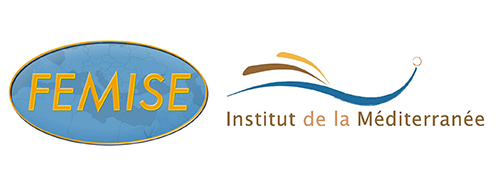 Official registration for Emerging Valley 2018 which will take place on November 20th and 21st in Marseille (Palais du Pharo and Thecamp) are now open !
Official registration for Emerging Valley 2018 which will take place on November 20th and 21st in Marseille (Palais du Pharo and Thecamp) are now open !
IM-FEMISE Workshop: Discovering Social Change Makers in the Mediterranean and Africa
FEMISE and Institut de la Méditerranée (IM) are delighted to join this great event and organize the workshop “Discovering the “Social Change Makers” in the Mediterranean and Africa” (20 November 2018 at 15:00). Social entrepreneurship refers to the practice that combines innovation, dynamism and the ability to address important social and environmental challenges. The support of states and multinationals around the world has been very encouraging for this model of innovative social activity. A real potential, still weakly exploited,also exists in the framework of the cooperation between the EU and Africa and in particular with the Mediterranean countries of the South Shore.
The social entrepreneurs mobilized by FEMISE and IM will present innovative initiatives, capable of meeting important social and environmental challenges in Egypt, Palestine, Morocco, South Africa, Lebanon, the MENA region and France. The Concept Note of the Workshop is available by clicking here (in french).
Register !
Discover some of our Panelists at the IM-FEMISE Workshop by clicking on their card
Emerging Valley 2018
Placed under the High Patronage of President Emmanuel MACRON and first event receiving the Digital Africa label, EMERGING Valley gathers this year
· More than 100 Startups, incubators and investors from 20+ African countries that will meet in the second city of France to connect African and European innovation: Senegal, Benin, South Africa, Kenya, Nigeria, Ivory Coast, Morocco , Egypt,
· The venue of country delegations (Brazil, Tunisia) to find partners, clients, support structures to create value around Africa in Marseille
· Dozens of keynotes, plenary sessions, workshops to discover and do business with the champions of African innovation in two exceptional places: Le Palais du Pharo and thecamp
· Business and networking with investors, VCs and Angels from Europe, Africa and the Mediterranean
· A simultaneous acceleration program during the summit with AFD’s Social and Inclusive Business Camp on social impact and financing
· The exclusive launch of the Digital Africa platform on November 21st at thecamp, a support system for African start-ups launched by President Emmanuel MACRON to support the entrepreneurial dynamic on the African continent through the digital economy.
Come to meet them by registering on this link
![]() The financial contribution of FEMISE towards the event is made in the context of the FEMISE –EU project on “ Support to Economic Research, studies and dialogues of the Euro-Mediterranean Partnership » . Any Views expressed in this event are the sole responsability of the speakers.
The financial contribution of FEMISE towards the event is made in the context of the FEMISE –EU project on “ Support to Economic Research, studies and dialogues of the Euro-Mediterranean Partnership » . Any Views expressed in this event are the sole responsability of the speakers.



